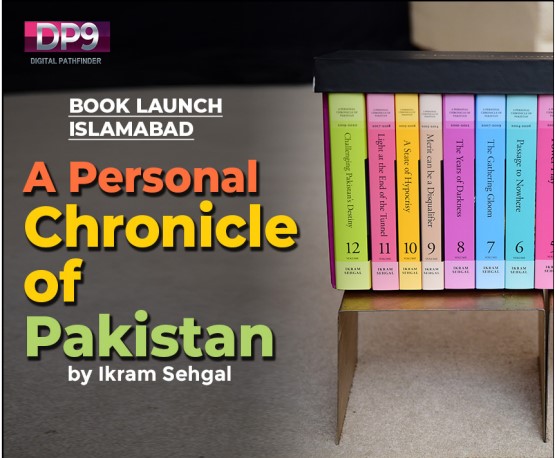The launch of Ikram Sehgal’s published work in 12 volumes under the title “A Personal Chronicle of Pakistan” was held at the Marriott Hotel in Islamabad on August 05, 2021. The volumes contain the compilation of the writer’s articles published in different newspapers over the last 40 years. Ikram Sehgal, noted defence and security analyst is Chairman Pathfinder Group, Chairman Karachi Council of Foreign Affairs (KCFR) and the Vice Chairman Board of Management Quaid-e-Azam House Museum (a Nation Building Institution. The event which was moderated by Dr. Moeed Pirzada, noted journalist, political commentator and television anchor was attended by a galaxy of dignitaries from politics, bureaucracy, intelligentsia, diplomatic community, academia and the media, all gathered to celebrate the book launching ceremony.
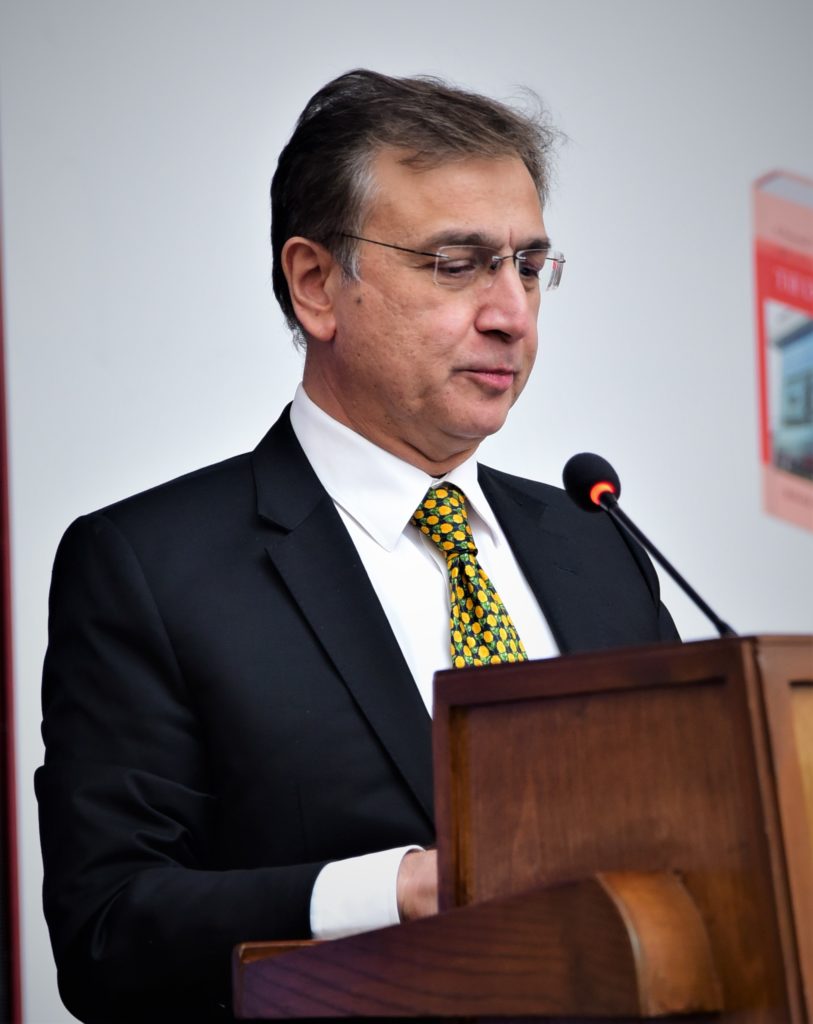
Dr. Moeed Pirzada: Today’s a very important day. What I’m going to talk about today is also very important to me. I have been reading Mr. Ikram Sehgal for a number of years, he has been an intellectual mentor. I’ve been publishing him too because I’m a publisher as well. What we are actually witnessing today is not a book launch, it is in fact a compendium. It’s a collection of books. What you see over here in the twelve volumes is a lifelong collection of the well-researched work and commentary which Sehgal sb has been making from early 1980s. It’s a very valuable addition to the literature that is available in Pakistan’s history, Pakistan’s politics, its wars, its conflicts, its transition, its social evolution, its conflicts, its economy and this is actually going to fill a huge void because as many of you might realize, most of the literature that is available on Pakistan looks at Pakistan from an external lens; it looks at Pakistan from either British historiography or Indian historiography. What we see over here is an original, Pakistani comment in English about Pakistan in a country where now 65% of the Pakistani population is less than 35 years of age, and this volume is 40 Years of Pakistani history, which was written when history was unfolding, when history was defining itself, when things were really happening. It’s a very valuable addition and I commend Ikram Sehgal sb for publishing it. In fact, when I received these volumes I was overjoyed, and my daughter who is 16 immediately took control of the collection. She took it in her room and we read some of the pieces together. One of the pieces was actually about Mushahid Hussain, and there was a comparison, which is actually very interesting comparison written in 1996-97, when Mushahid Hussain Syed sb had taken over, he was launching the political campaign for the re-election of Nawaz Sharif. Ikram sb offers a comparison between a parallel political campaign which was being run by Hussain Haqqani who was actually campaigning for Mohtarma Benazir Bhutto, and he makes an intellectual comparison between the strategies; the ethical versus the unethical, the choice of the words and all that. If you go back to that piece, you’ll remember, so that is why I am saying this is a reflection on the history, the way it was happening. It was happening then and this is how he’s recorded it. It’s a very valuable edition on 40 Years of Pakistan’s history. Now, the way we will go ahead is that Ikram sb had cultivated friends, influential opinion makers, in this country and all across the world and they have also sent their messages. So we will play those video messages, I’ll briefly mention their profile as well and then as we go along, I will also request the speakers from here. We can see a very majestic galaxy of speakers over here.
So first of all, let me play the comment and the message from His Highness Nahyan bin Mubarak Al Nahyan who is a senior Cabinet member and Minister of Tolerance and Coexistence in the UAE. It doesn’t need any introduction for those who are familiar with International Relations. You can also see his profile over here, and I would request his message to be played. Thank you.
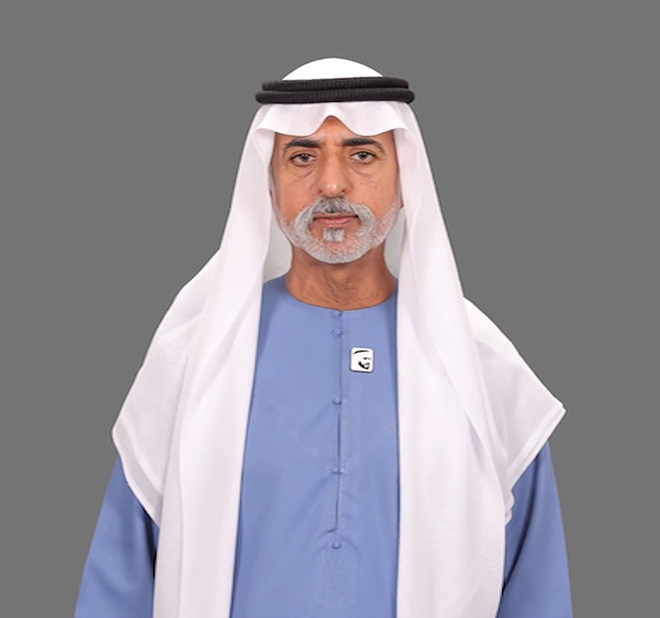
His Highness Sheikh Nahyan bin Mubarak Al Nahyan: The very best way to celebrate the publication of Ikram Sehgal’s life story and of his contributions to public life over the past 40 years, will be to read his remarkable book that is being launched today. The book clearly signifies what we all know about Ikram Sehgal’s dedication, commitment, common sense, and generosity of spirit. His contributions to public discourse and discussions of important national issues that are displayed in this book are a reflection of his hard work, loyalty and commitment to Pakistan and its people. Ikram is a very close friend. Actually, he is more than that. He is a brother and is one of the most accomplished and dedicated people I know. I’ve come to value his achievements and his counsel. As a member of the Board of Directors at Bank Alfalah, he provided sage advice and incisive observations, even more important, he was always a reliable moral compass as well as an advocate for societal progress and human welfare in his beloved country.
As the dedications of the various volumes in the book show, he is truly inspired by his deep love for his country, for his family, for his mentors, and for his friends and colleagues alike. We naturally praise Ikram Sehgal for his great success throughout his life. Ikram has marshalled his education, his experience, his intellect and his character to produce work of the highest quality. We also appreciate Ikram’s understanding of Pakistan’s national aspirations as is clearly evident in the various articles of this book. He has witnessed the country’s successful quest to become a truly global force for progress, not only a center for finance, business, education, technology and culture; but also a nurturing source of innovation and creativity that promises to benefit the whole world. Ikram, my dear brother, I know what a commitment you have made to your beloved country over your lifetime. I’m honored to have this opportunity to pay tribute to you. You have my highest regards and sincerest gratitude for the excellent work you have done. In my opinion, this book will inspire readers everywhere. On behalf of everyone assembled here today, I thank you for this compilation of the articles you have written over the last 40 years that tell your story and present credit to you and to Pakistan itself. I am confident that this book will help to promote knowledge and pride in Pakistan and its great people. Your contributions will also encourage sustained and continued effort to explore and preserve Pakistan’s great history, heritage and traditions of dialogue and cooperation for a common national cause. Congratulations on the publication of this interesting and valuable book.
Dr. Moeed Pirzada: You just heard a message from Nahyan bin Mubarak Al Nahyan who is a senior Cabinet member and Minister of Tolerance and Coexistence, and you might have noticed that he used the word ‘brother’ for Ikram Sehgal, and the reason is this that Ikram Sehgal has remained committed, not only to the nation state of Pakistan, but he has a very strong commitment to his friends and mentors throughout his life, which has been a hallmark because I know him. Let me now request the former Prime Minister of Pakistan Mr. Shahid Khaqan Abbasi to grace the podium. Sir.
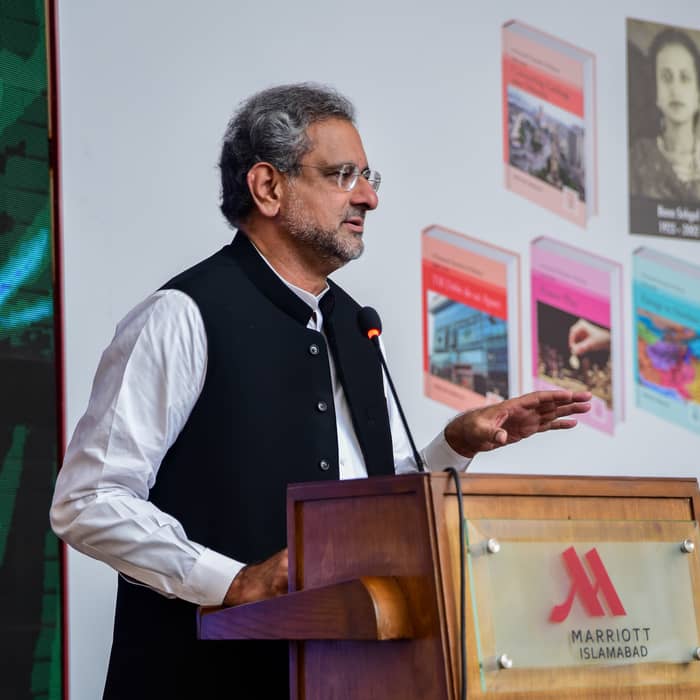
Shahid Khaqan Abbasi: Bismillah-ir-Rahman-ir-Raheem. Distinguished ladies and gentlemen, it’s a privilege to be here and Sheikh Nahyan called Ikram sb a brother, I generally call him uncle because I inherited him. I’d had this relationship through my uncle with whom Ikram sb served in East Pakistan and in West Pakistan and they held each other in great esteem. They always talked about their tales as soldiers, and I often read Ikram sb’s articles, in which he had mentioned some of the things about their experience. Ikram sb is a witness to history and it’s been a turbulent history in the last 40-45 years. I think he has done us all a service by printing his articles in the shape of a collection of books. But I also feel he is a brave, man, because most of the things that you write in articles, often come out to be not very factual, and the analysis, generally turns out to be wrong. I think he’s taken a lot of courage to publish the books and give us a view of history. He has been a witness to history himself, so it’s I think this is a rare view into the history of this period, and how it was thought of at that time.
In hindsight, we can look back and we can see where the mistakes were made, and I also say it takes a lot of courage to write these articles because we are a unique country, in the sense that what you read is generally not the reality. The reality is often invisible and it mostly comes out through articles later in history, on what happened at that particular period. So Ikram sb has taken what he wrote about issues in the current period and had the courage to publish them. So I think it does provide a great sense of what was happening in those periods and if I looked at the books correctly, I think they’re also collected by the subject matter that he wrote on. I always have read his articles over the years and they’ve been a source of information for me. I completely disagree with his political views, I may disagree with his analysis, but I think he always presents an alternate viewpoint to at least what I have thought about a particular subject. That is how we all learn and we all progress. So I’m very grateful to Ikram sb for taking this initiative. I think it’s probably the most beautifully bound set of books that I own, so I am grateful to him for that. It looks very nice on the shelf so Ikram sb thank you very much. I can keep saying a lot more, but let me just paraphrase, President Johnson, I always kind of say when people ask us, you know, why does Pakistan have so many problems? I think they are mostly because the brightest people and the people who have all the solutions are writing articles. Thank you very much.
Dr. Moeed Pirzada: Thank you. Former Prime Minister Shahid Khaqan Abbasi for your comments. Everyone refers to this as a book. This is not a book. This is a compendium. This is in fact, several books, and since I had been reading most of these pieces and I got the collection I also went back and I can actually say that they are very informative. They’re not just opinions, because these pieces, that is why I said in the beginning, they are very helpful because there are a lot of facts in it as to what was really happening so, it’s a very informative addition to the history of Pakistan. Let me now play a video message from a very prominent journalist. A writer, a known author, he has written more than one book. You have seen his columns in Dawn as well. Owen Bennett-Jones. You can see his profile over there. Let’s listen to him.
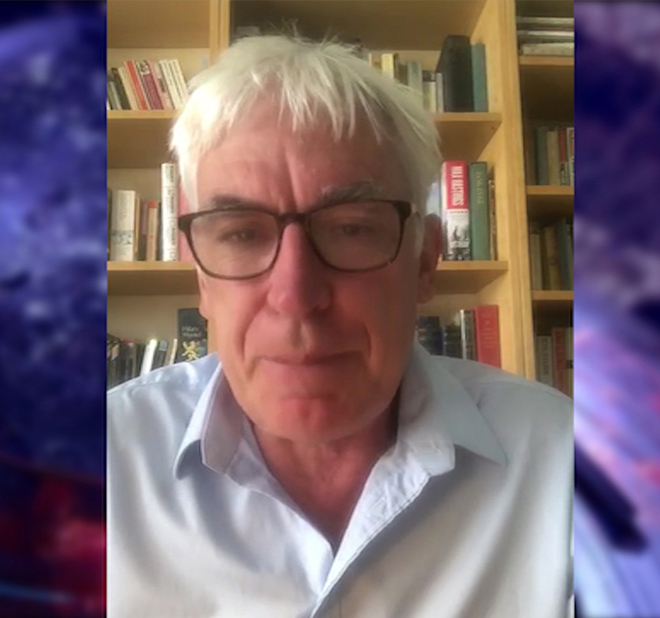
Owen Bennett-Jones: As anyone who has read Ikram Sehgal’s columns over the years will know, he is a very prolific writer and not just that, he writes on a huge array of topics. There’s all the stuff that you would expect from a Pakistani columnist on what’s going on this week or this month, but also broader topics deeper topics things such as military strategy, economics, which obviously with his vantage point of being one of the country’s leading businessman, he’s able to pronounce them; and also moral issues such as inequality, there are some very powerful articles in which Ikram Sehgal is effectively complaining about some of the people he might naturally move around with in his business career and not being more concerned about what anyone would really have to say, so there’s a huge range of material. Not only that, there is a global perspective and that’s perhaps one of the most useful things he can bring to his columns and therefore by extension to these books because as someone who attends Davos, as someone who attends the World Economic Forum in Switzerland, where the world’s leading political and business figures meet, but also traveling widely in the US and Europe and UK, it does give a different perspective which many Pakistani commentators, journalists and so on lag.
It is, therefore, a really important perspective for Pakistan to have commentary from people who understand where the country is in the in the broader scheme of international affairs. There’s a common theme to all this material. Ikram Sehgal is fiercely patriotic as most Pakistanis are, and that is reflected in the columns. He’s also hopeful that the military can institute change in Pakistan to a greater degree, but underneath that, there is a real understanding of the limits of military power and the desirability of civilian government, if it can be done in a non-corrupt way; so, there’s an awful lot of material in these articles, in the collected works that he’s put together here and I recommend them to you.
Dr. Moeed Pirzada: This is Owen-Bennett Jones and a very interesting comment from him. Ikram Sehgal’s writing has always been very pro-federation, pro-nation-state and state-oriented. Let me now call on stage my lifelong intellectual mentor, Senator Mushahid Hussain Syed who is Chairman of the Senate’s Defense Committee and is also a subject of these writings. Senator Mushahid Hussain, sir.
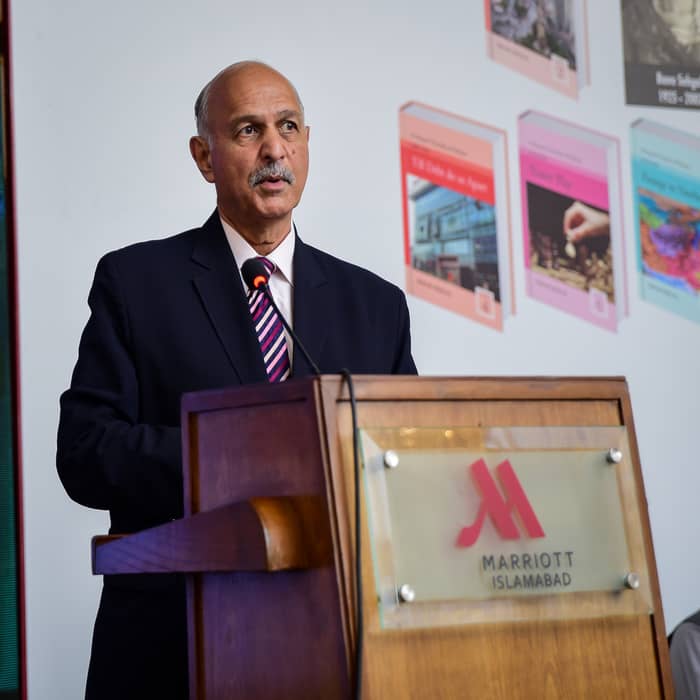
Senator Mushahid Hussain Syed: Thank you very much. Assalam-u-alaikum and good afternoon. It’s a great pleasure and privilege for me to be here at the launching of what should I call them? I have in my library the collected works of Lenin and the selected works of Chairman Mao, so your twelve volumes, Ikram, qualify as what should I call you, Major Sehgal or Chairman Sehgal because you are Chairman of the Pathfinder Group also, but anyway, Chairman Sehgal’s collected works.
Since today is August 5th, the second anniversary of the Black Day in Occupied Kashmir 2 years ago, when Narendra Modi annexed and illegally occupied Kashmir. Kashmir was already under occupation, but it was annexed also, so I’ll start with your article, which you wrote last year and which is in your selected works. It’s called and it’s very aptly called Kashmiri Lives Also Matter. This was written on 17th of July last year. It was published in the Daily Times and it’s a take on the Black Lives Matter Movement, which was then at its peak and which cost Trump his presidency, I think largely apart from COVID. So Kashmiri Lives Also Matter is among a series of articles, which Ikram has written to express solidarity with Kashmiri people because today is the Black Day of Kashmir and he mentions how this action of Modi is going to unleash a series of events including repercussions in the region, and he has been proven right, because he writes in that article, that it will lead to worsening of relations, not just with Pakistan, but also with China and you can see that with China there have been two major clashes between the Indian military and the Chinese People’s Liberation Army for the first time in about 40 years, and that was because of the provocation. Ikram also mentions in this article Kashmiri Lives Also Matter, which was published on 17th of July last year in the Daily Times, that 25,000 domiciles have been issued by the Narendra Modi government in Occupied Kashmir to facilitate an influx of outsiders in violation of their own laws. I’d like just to update you on that information that as of now, two years later, 3.8 million domiciles have been issued 3.8 million with 1.2 million new names added to the voters’ list; so what you alluded to rightly in your article a year or so ago, is unfortunately, proven to be correct that there is an attempt to transform a majority into a minority through demographic transformation.
Ikram and I go back a long way. We have been friends and buddies for over three decades and it’s also because there is a cultural camaraderie because we are both products of the cantonment culture. We are both military brats. Both our fathers were Colonels in the army of Pakistan, and his mother was Bengali. His father was from the Punjab, and I also happened to be in East Pakistan because my father was there. Ikram, we have always discussed a smattering of Bengali (speaks in Bengali), because we both studied in Adamjee School and at that time, it was necessary for students from West Pakistan to learn Bengali, and those in East Pakistan were learning Urdu. One big quality of Ikram that I have seen over these decades is his ability I think that’s the highest form of courage speaking truth to power. irrespective of who has been in power, whether it’s the Khaki or the Mufti and that’s why he’s often landed in trouble. But he’s a survivor and I commend him, and Ikram, because of his own abilities, has also very good quality of segregating his relationships, compartmentalizing those. He has been good friends with two prime ministers Mr. Nawaz Sharif and Mr. Imran Khan, and he has advised both of them separately, correctly, which is a rare feat also.
I’ve seen your article, Ikram, where you mentioned, referring to the current Prime Minister, that if, and I quote from that article that if opportunists join Imran Khan, he will lose total credibility and he will not be able to put together a team. I think you should send him this article again because I think it will do him good at this time in absence of a good solid team, and about Mr. Nawaz Sharif, I still remember, the famous lunch in Murree which we had with him. Ikram and I was there and at that time also Shahid Khaqan Abbasi sb the more things change, the more they remain the same. Nothing has changed in 25 years. PML-N was at a crossroads; we were saying, what is to be done, we had lost the election, we were in bewilderment. Nawaz Sharif sb asked Ikram Sehgal, since Ikram was very close to the corridors of power, his good friend Ali Kuli Khan was then I think the Chief of General Staff and Kakar was the Army Chief, so there was his proximity, his proximity to GHQ was there, his proximity to popular politicians was there. He said that the only way forward is that you have to mend your fences with President Laghari, because there is 58 2(b) in the Constitution and that is the only constitutional route where the government can be changed, because it was just after Tehrik-e-Nijat where a movement had been launched. Well, there were problems then but Mr. Nawaz Sharif followed that advice, and also Mr. Nawaz Sharif sent him on a very important and sensitive mission, which I am privy to, during May 1998 when India did the nuclear tests. We had already taken the decision, and it was a decision of Prime Minister Nawaz Sharif soon after India tested that we will go for the test, but will not announce it. He asked Ikram to please talk to your friends in the UAE royalty, check with them that if we test the bomb, we go nuclear, how will they react? And I think that he came back with a thumbs up. I’m sure you must have met Sheikh Mubarak and other people in royalty and he gave a very positive message because we were expecting that once we test, we will have sanctions from the West and will need support from our Muslim Brothers, which we got from UAE, from Saudi Arabia, and from others.
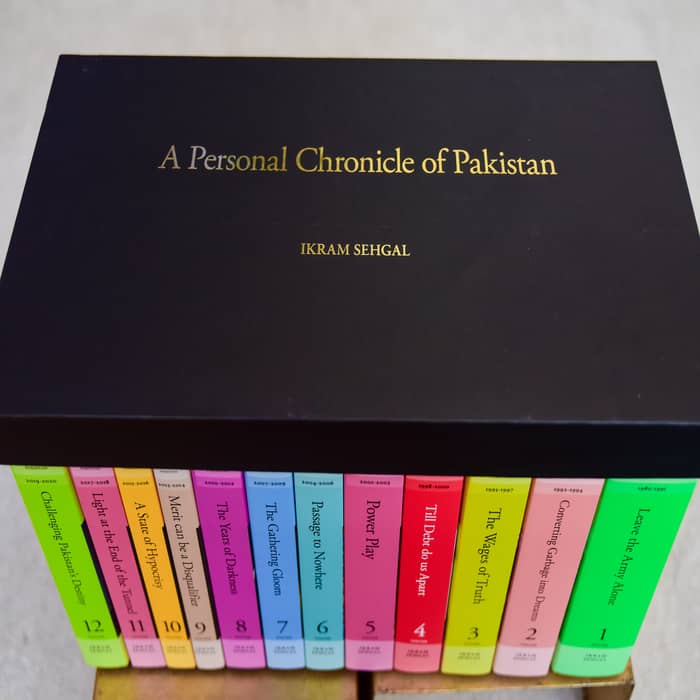
I think the time has again come, when we talk of politics, Ikram, that perhaps you need another meeting with Mian Sb, and I’ll ask Shahid Khaqan Abbasi to arrange a meeting, maybe you go to London and give him some advice of late also. One thing about Ikram is that he has toyed with the idea of mixing his drinks, being close to politicians, but maybe joining politics I used to joke Ikram you’re giving Senatorial looks but then he never took the plunge. He has been close to the corridors of power but never actually joined power formally; and I’m glad that as a result we have a powerful pen of an independent individual; who still has the courage to speak truth to power. So more power to his pen and good luck for the future and I wish you good health for the future also. Thank you very much, ladies and gentlemen.
Dr. Moeed Pirzada: Thank you Mushahid sb. Mushahid sb noted that Ikram Sehgal has been speaking to truth to power and has been writing his mind. Interestingly, they were friends for 30 years, but his writings are pretty critical of Mushahid Hussain sb as well from time to time. Let me now play the message from Dr. Frederick Starr, who is Chairman Central Asia Caucus Institute and Silk Road Studies Program and President of the American Foreign Policy Council in Washington, let’s listen to what he says.
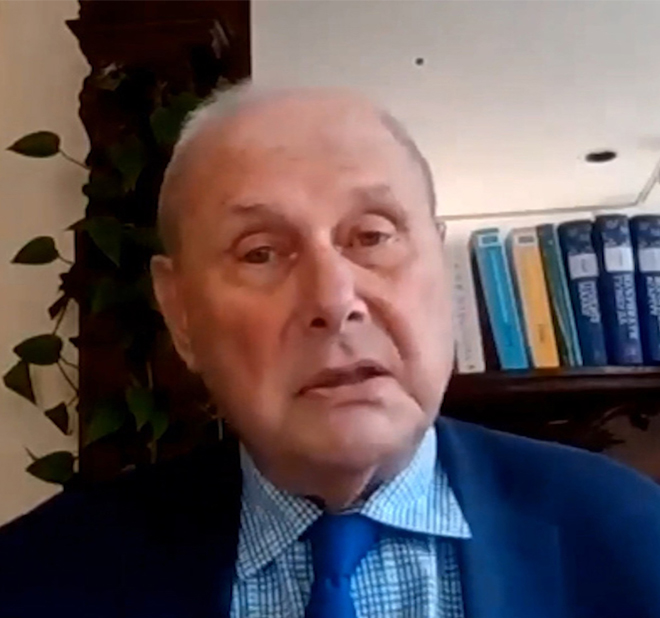
Dr. S. Frederick Starr: Every country needs authentic voices of its own, not just the voices of officials, but the voices of men and women who are deeply informed, judicious and above all independent. In other words, every country needs, the voices not just of its officials, but of its citizens. For Pakistan, Ikram Sehgal is such a person, a pilot, military officer, a war hero and successful businessman. He brings to his writing an extraordinary breadth of experience. He’s also a most engaging writer. I know, from long experience that if I begin a Sehgal essay, I will read it to the end, and then most likely share it with a friend or two. I’m sure all of you do the same.
It’s not important really that. Mr. Sehgal’s readers agree with all his conclusions. Indeed sometimes he leaves me scratching my head or even disagreeing outright. That’s just as it should be, for Sehgal is not a dogmatist. It is no accident that I read him for his careful presentation of often neglected data and for his ability to respectfully consider other interpretations besides his own.
So in short he is not a polemicist but a true educator who deserves to be recognized as such. Today, we are all celebrating the publication of twelve think of it twelve volumes of Ikram Sehgal’s collected essays. This should have happened long ago. Thinking back, I feel silly having encouraged him years ago to publish more abroad without appreciating the sheer quantity, range and quality of his existing writings in Pakistan. For all his achievements Ikram is a modest man. I’m honored to join you in this celebration. I do so with deep respect for the author who’s rightly acknowledged for the depths of his insights on Pakistan, its neighbors and the broader region, and our infinitely complex global world today. I thank Mr. Sehgal for all he has done and will await volume 13 of the series with keen anticipation.
Dr. Moeed Pirzada: This was a message from Dr. S. Frederick Starr, you just heard, and as I mentioned earlier that Ikram sb has always been holding his friends and mentors close to him. Gen. Ali Kuli Khan is a lifelong friend of Ikram Sehgal sb, President of the Ghandhara Nissan and several other Industries, former Chief of the General Staff and Co-commander of the army and former Chairman Veterans of Pakistan. I request General Ali Kuli Khan to come and grace the occasion with his comments. Thank you.
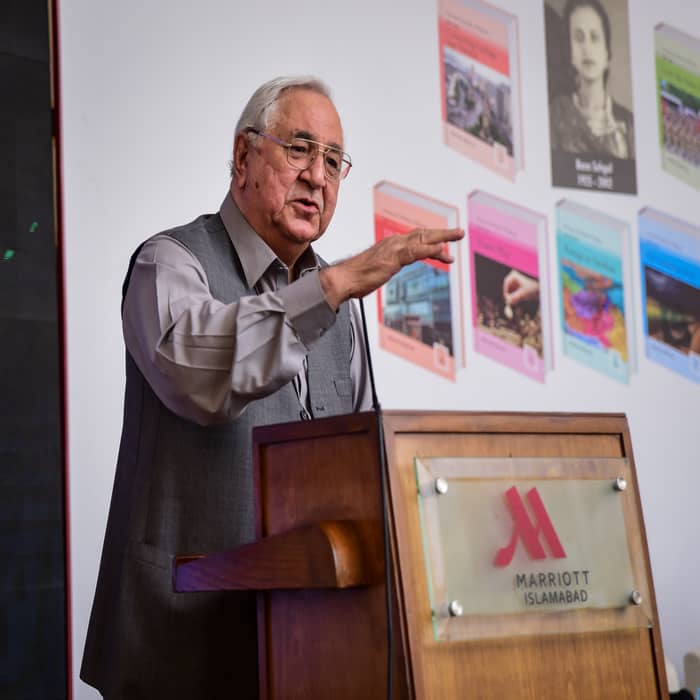
Gen. Ali Kuli Khan: Bismillah-ir-Rahman-ir-Raheem. Distinguished ladies and gentlemen, it’s a great honor to be here to talk about my very dear friend and brother Ikram. Somewhere I had read that I should keep my talk limited to five minutes. I regret to inform you that I will certainly overshoot that. Five minutes for me to encapsulate a friend’s lifetime with whom I have great camaraderie is not possible.
Recently reading or trying to understand the Quran, I came across that two absolutely unforgivable sins that exist are, one is someone who shows disrespect to our Prophet Muhammad (Peace Be Upon Him) that man or person may have had a room full of good to his name, but the moment he or she shows any disrespect to Prophet Muhammad (PBUH), everything goes poof gone wasted. The second really important and really serious sin is being disrespectful to your parents. Similarly, as I said for respect to the Prophet, if anybody even in his mind, disrespects his parents, poof-it’s gone again. You might be the best man, but it comes back to zero. I’ll talk a little about Ikram’s parents because it’s important to do that, and Ikram’s father belonged to Sialkot, the city of our poet Allama Iqbal, and his dear wife, Ikram’s mother belonged to Bogra, to a very respectable family in what was East Pakistan, Bogra still exists.
This marriage of Col. Majeed Sehgal and his wife Bano Sehgal was an ideal sort of arrangement because as I said, joined both East and West Pakistan and Ikram’s father Col. Majeed Sehgal belonged to 19-Punjab, a very celebrated battalion of the Pakistan Army, and then he was raised to East Bengal, who are known as Junior Tigers, and he did that very successfully. Of course, his wife was besides him in all these tasks and played a very, very important role. Ikram, like his father started his military career in 2-East Bengal where he grew up, as his father was raising this battalion, and Ikram was known as Chand baba because he was the battalion’s baby, he grew up there, and of course in 1970 or maybe a little earlier, Ikram and I were thrown into the same army unit, which is the 4-Army Aviation Squadron. We were both helicopter pilots and although we came from different schools; Ikram belongs to this very famous school, which has a strong representation here called Ghora Gali or Lawrence College, Aitchisonians and Gallians get along famously.
I’m saying this, as I said on record, the services of GG to the Armed Forces of Pakistan far exceed those of Aitchison. Another thing which I just want to mention with regard to Ikram’s parents, some of you may be knowing but some of you may not, on 17thJuly the first book launch in Karachi, that particular date was chosen because Ikram’s late father would have been a hundred years old on that date, so this is his, sort of contribution to his father, and to explain to him that he hasn’t been sitting idle all this life and I’m sure he would be very proud of Ikram. Ikram’s father died young, he was barely 62 years of age. But of course, he was a very well-known army officer and he had done great service and he, as I said, is the name that most people remember, most of the people in East Pakistan even today remember him, the leadership included. I of course, as I said, know Ikram since a long time, we were in rival schools, public school, and there is something which I want to mention here, the principal of Lawrence College is here also. People tend to sometimes forget that all these public schools which the British left for us are a great source of integration within the country. When I was young, there were not too many of them, there were a few. But now, of course, these public schools are spread all over the country, which is a good omen. Without any disrespect to that bunch sitting there, these public schools are not necessarily known for their scholastic excellence, but they are certainly trained in bringing up Pakistanis. When you live together, there are people, in Lawrence College, in Aitchison and all these are people from all over the country and when they serve, it’s a point of great integration which is always a plus point in any country.
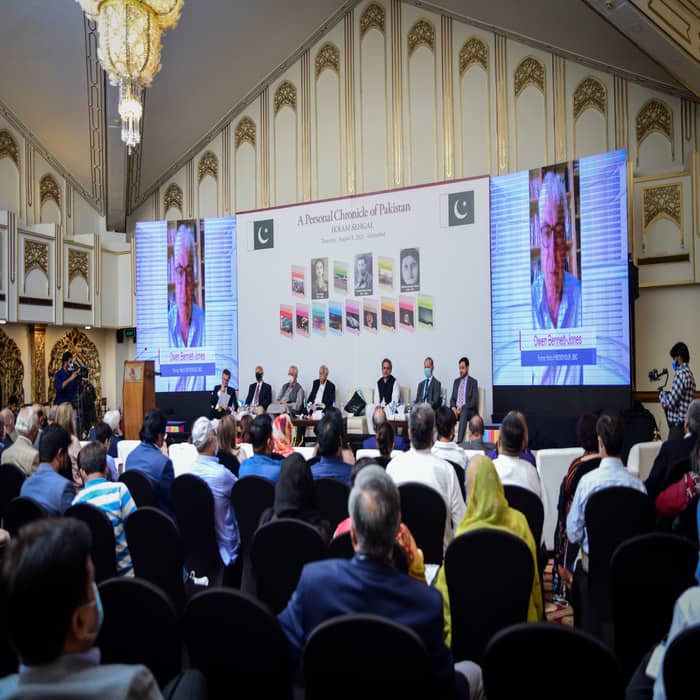
Ikram had a brilliant army career like his father, and come ’71, his problems in a way started. Our unit, part of it was in East Pakistan, and part of it was in West, but we were there and Ikram and I became close because we were in the same unit and I could see his worry, his hurt, just as it was with me, that Pakistan was being torn asunder and it went on and painfully after the cyclone things got worse and worse. Of course, personally, I am absolutely sure and there is no need to emphasize any more on that, this was a huge international conspiracy led by our neighbor, the Indians, but I don’t blame them, what I blame is ourselves because it was so open and we didn’t see it coming. We were young at that time, but there were certainly people older than us who should have seen it coming.
My wife and I, we went for the first time to East Pakistan in 1966 for our honeymoon. Of course we lived with the Bengali friends of our parents and enjoyed the honeymoon like any honeymooners would. But even at that stage, it was apparent to the honeymooners also, that something was amiss, there was something boiling below the surface. This is 1966, and unfortunately, this thing was allowed to go on and we didn’t take steps. I think we were less than wise and then when it came down to us, we took everything lying down. Ironically, there was so much rubbish, so much lies written about East Pakistan, that it’s really unbelievable, that everybody in West Pakistan, me included, took everything lying down until a lady came about by the name Sarmila Bose. Sarmila Bose is the grandniece of Subhash Chandra Bose, and she was a college going student in Calcutta when these troubles in ‘71 started. She’s written a book, and very well-researched book, called The Dead Reckoning which is an aviation term, and in that she has brought out very clearly, the rubbish that came out I regret to say in the Bengali press and all over the world, and went unanswered from people in this part of the world. But such is life. They might have thought they have got rid of Pakistan or at least got rid of a part of Pakistan. I really wonder as things are developing even now, they have separated East and West Pakistan, but instead of one Pakistan, there were two Pakistan’s which came about, and as things are, keep your fingers crossed, I think we are moving back again, may not be as one country, but we certainly are moving back in the same direction and the people who had torn us asunder are very worried these days.
Ikram, as I said in ‘71 came to Dhaka and his unit, which his father had raised 2-East Bengal, Junior Tigers was just north of Dhaka, about 8-10miles, and like anyone, he went to see them because 2-East Bengal had rebelled, which was obviously, very, very troublesome to Ikram. I would have done the same if my battalion was accused of the same thing. He went there. He was got hold of, he was made a prisoner. He was, of course, thank God, handed over to the Indians and from there, he escaped and came back to Pakistan and fought the war in Chhor, and Abbasi sb’s uncle was there. He was his Commanding Officer, Brigadier Taj, who was an SJ and Bar and an outstanding soldier. He was Ikram’s Commanding Officer, talked wonderful things about Ikram, gave him a battlefield promotion there and then for his excellence.
Ikram, as I said, came back, and of course, then after the war, he was very cruelly put aside by the army, but anyhow, Ikram is not someone to take anything lying down. He started his second career as a businessman and it is to his credit that he built it brick by brick. Today, he has a business empire, which is outstanding in every respect, and of course, with Ikram comes his dear wife and children and grandchildren. I was very happy to learn something yesterday. I met young Suleiman sitting next to his mother. He is Ikram’s grandson and he told me Zarrar is in New York for some time for education. Suleiman says, as soon as my education finishes, I am going back to Pakistan, which made me very, very happy. Well done, Suleiman, we await your arrival.
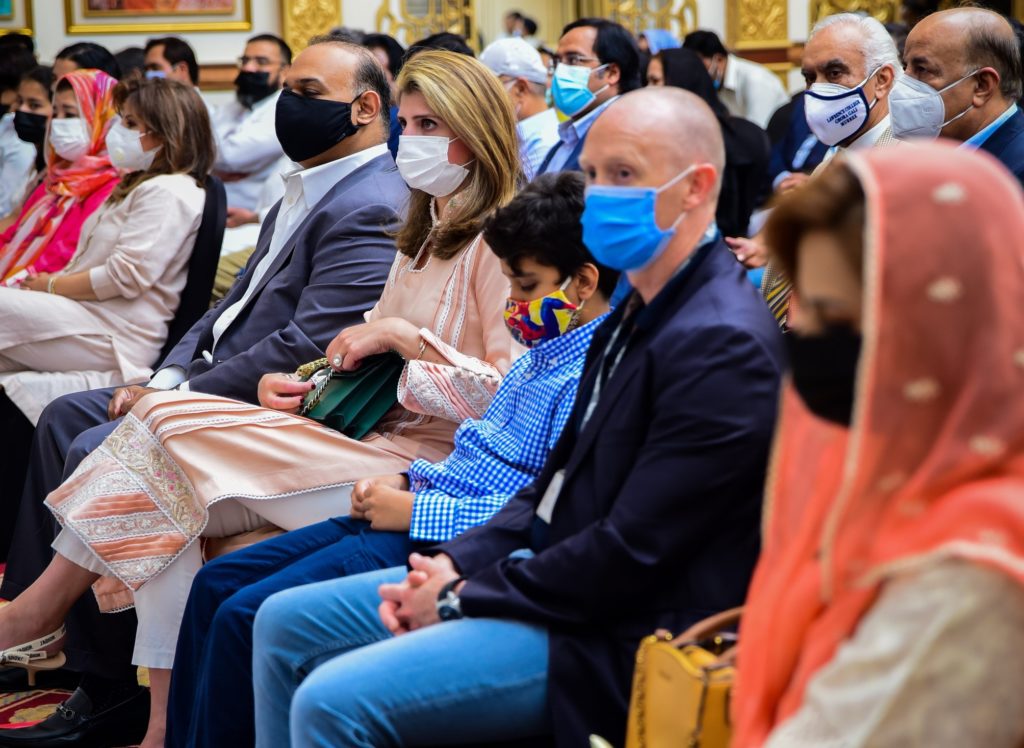
Ikram’s wife who has brought up the children, and Ikram’s daughters, each one of them, and granddaughters also, great personalities in their own right, but as I said, it may be anything, but I always love people who go out, learn, but come and serve Pakistan. Of course, as I said, Ikram came back, initially in 2-East Bengal, became a prisoner of war, came back, was thrown into 44-Punjab in the Chhor area, and 44-Punjab then became 4-Sindh, as I said, from Punjab, to Bengal, to Sindh, he served with all of them. Now, he’s gone a step further. Ikram’s son Zarrar is married to a lovely Pathani sitting next to him, Kashmala, and if I may use the Urdu term sonay pe sohaga, Kashmala is not only a Pathani, she is also a thoroughbred Khattak.
Anyhow, it’s a great pleasure to talk about our friend and one last word, which I will just mention. Ikram’s father would have been a hundred this year, my father, if he had been alive, he would be probably 107 or 108, but he died in 1994 December. While we were getting his papers in place, we came across his big pile of newspaper cuttings, so I looked at it thinking what were they? They were all articles of Ikram that my father, had studiously, dutifully, cut out and kept them. So he spread from his generation to my father’s generation and of course, to the younger generation. Ikram I wish you all the best, and it’s a great honor to have you as my friend and brother. God bless you, thank you.
Dr. Moeed Pirzada: Thank you Gen. Ali Kuli Khan sb. Now, I’m going to call a very interesting gentleman here to the rostrum and a few words before that. With the rise of television and now social media, YouTube, the written word is less and less important in a country like Pakistan, which is becoming more an audio-visual market of ideas. The gentleman I’m going to call is a great lover of the written word. I met him when he tracked me because of my writings and when we met, we only discussed the written word and the writings. I’m going to call his Excellency Yves Manville, the Deputy Chief of Mission of France in Pakistan.
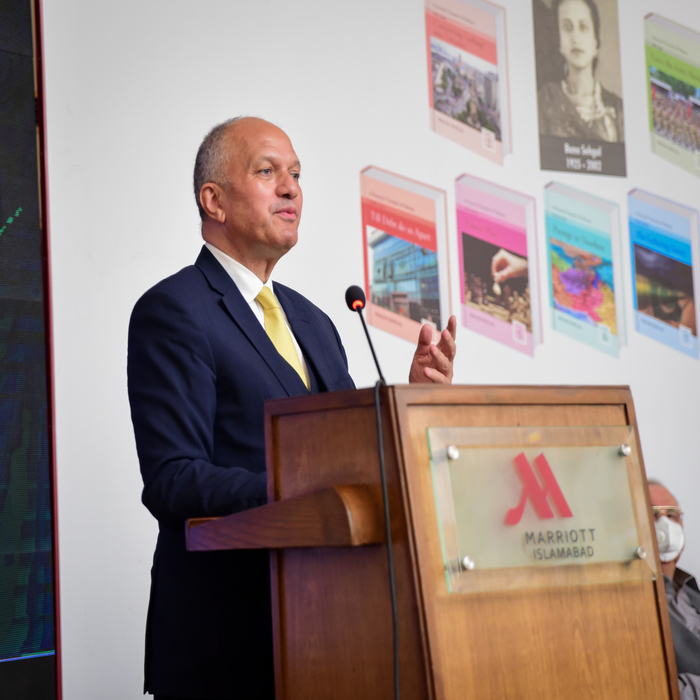
H.E. Yves Manville: Thank you to all. Please be indulgent with me because first it is an improvisation, I didn’t plan to speak today, and secondly, it’s in English and English is always difficult to pronounce for a French man. The first time I met Mr. Sehgal, it was 12 years ago in Brussels during a meeting of East-West Institute about Central Asia. I am in the Central Asia posting for a long time. I’ve been posted in Iran, Tajikistan, in Afghanistan before here, and I started to read Mr. Sehgal in the Pakistani paper that I’ve subscribed to a long time ago. I was already planning to come one day to this beautiful country. I’ve always been impressed by the life of Mr. Sehgal. It was like, you know, when you read about the Roman Heroes, ancient Greek Heroes, the Byzantine heroes, these people have ten lives in one life. You don’t understand how they can manage and how they have time to have all this adventure.
I will not forget to speak about the mother and the father of Mr. Sehgal, because one always follows footsteps of their parents. If I have to briefly sum up what I want to say, I would say that that Mr. Sehgal is a non-aligned, free spirit. It’s not only that you cannot imprison his body, you cannot also imprison his spirit. As they tried to imprison him but he escaped in a great adventure. He is always talking freely, is always saying his opinion truly and he always says the truth.
The fact that he’s building houses, mosques and school far away from the town in the mountains I saw some of these locations it’s always far away. It’s always something free, from scratch and shows his free spirit. I think that his life achievements show what dedication, loyalty and bravery can bring to Pakistan and what Pakistan can achieve with presence of such men. Pakistan is lucky to have men like Mr. Sehgal who dedicate their life to Pakistan. Thank you very much.
Dr. Moeed Pirzada: Thank you so much, His Excellency, Yves Manville, the Deputy Head of Mission of France. Now, as you might know that I myself am from the civil services, and when we joined the civil service many of us also opted for police, and I saw how they were transformed in a totally different cultural format. When they joined the civil services, they were very fond of reading and writing but then they adopted into a different culture, but the gentleman I’m going to call, Dr. Syed Kaleem Imam to the rostrum, he is now the Inspector General Motorway and Highway police. He has remained Inspector General in Islamabad police. He’s a lifelong student, unlike most police officers, completing his education and a few years ago, he completed his doctorate as well. Sir, very warm welcome here.
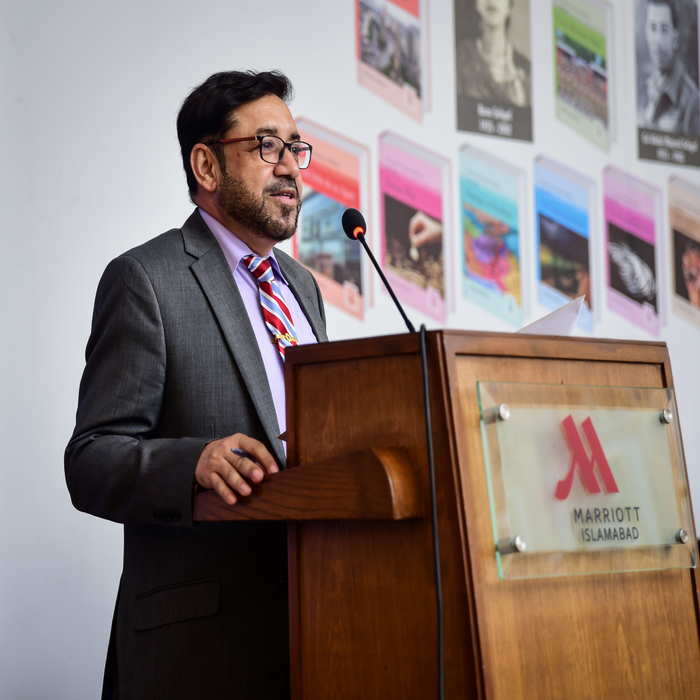
Syed Kaleem Imam: Bismillah-ir-Rahman-ir-Raheem. You see I’m carrying this file over here and a pen over here because my teacher taught me that whatever you do, look like a student and you should always be carrying something. I am one of the product of Mr. Ikram Sehgal and I have been following him for years and years during the time when I was doing my CSS, and my studies in my formative years. When Mr. Ikram called me and said that I’m going to launch a book, I was very pleased and I said count me in, I want to be part of it. But then I forgot as days passed by and my wife told me, we have a mango crate, and when I opened it, it were books. We thought it was mango season, and we are going to have one more crate of mangoes. People were very magnanimous sending us mangoes, they say we produce the best mangoes in Pakistan. Today is 26th Zilhaj, 1442, we started at 4:00 p.m., it’s 5thAugust and we will always remember this day as a day of Mr. Ikram Sehgal, A Personal Chronicle of Pakistan, 12 volumes. So I started going through these. A man who’s been watching me, especially when I was in Sindh he would call me and say theek ho? He was there to support me. When I went to his credentials and I have gone through them earlier also, and I thought I should share it with you. He won the Tactical Plaque, was the runner-up for the Sword of Honour. He was commissioned in East Pakistan regiment, like the General sb mentioned. Pilot from 1968 to 1971, and a POW in April 1971. When I hear about his stories of POW, I always remember Frank Sinatra, if you have seen Von Ryan’s Express in Von Ryan’s Express, Frank Sinatra is a pilot. He becomes a prisoner of war. He goes to a camp in Italy and the first desire or aspiration of a prisoner is to escape, the biggest victory that they can achieve. So Frank Sinatra says, even if one of us make it, we will assume that all of us have made it. He couldn’t make it. The beat of the story was that he couldn’t catch the train if you have seen the movie, but here Mr. Ikram Sehgal made it and we are so proud of you, Sir.
As I started scanning through the book, twelve volumes of his articles, 1935 articles, 7571 pages, and 3,28,000 words. Now, that’s quite something. Like Moeed has said, he has written about economy, commerce, international economy, international politics, corruption, accountability, foreign policy, internal and external policy, but I would quote, from his volume 3, the Wages of Truth, and I like this, in article ‘The Battle of Karachi,’ 27th July, 1995, he writes, “any reforms attempted without local body structures having the people’s confidence will never filter through to the populace or be accepted,” and this is reality. In Volume 8, ‘The Years of Darkness,’ the article ‘Battle of Karachi,’ on 14thJanuary, 2010, he writes, “setting aside race, religion, or political consideration, the real battle should not be for land, but for the hearts and minds of people,” and in volume 12, Challenging Pakistan’s Destiny, article ‘Police Reforms Committee,’ which is very close to all the police officers, 18thJanuary, 2019, he wrote “the glaring omission is not to have a posting, a promotion system in place adopted on the lines of the army, military sector MS Branch. Only an established career system will resolve issues about promoting the people on merit and posting them to the right place.”
When I see Mr. Ikram Sehgal, I believe he has been able to say what many of us don’t. He believed that the right things bring hope and are a reason of change. His thoughts have been translated into writings. Many of us don’t do that. In fact, he was born to tell. He resolved to live a life, to make a difference, his heart saw what was invisible to the eye. I am so proud to be here and being a student of Mr. Ikram Sehgal, I wish you all the best, Sir. Heartiest congratulations, a great day. Keep writing, there are lot of us out there who are following you, listening to your voice, and God bless you. God bless your family. My prayers and sincere wishes. Pakistan Zindabad.
Dr. Moeed Pirzada: Thank you Dr. Syed Kaleem Imam, Inspector General of police here. Let me now play the message from Dr. Mark H. Siegel, you can see his profile, he’s President and Chief Executive Officer of M. Siegel Associates, and he’s Director Global Security and Resilience projects. I would request his video message to be played.
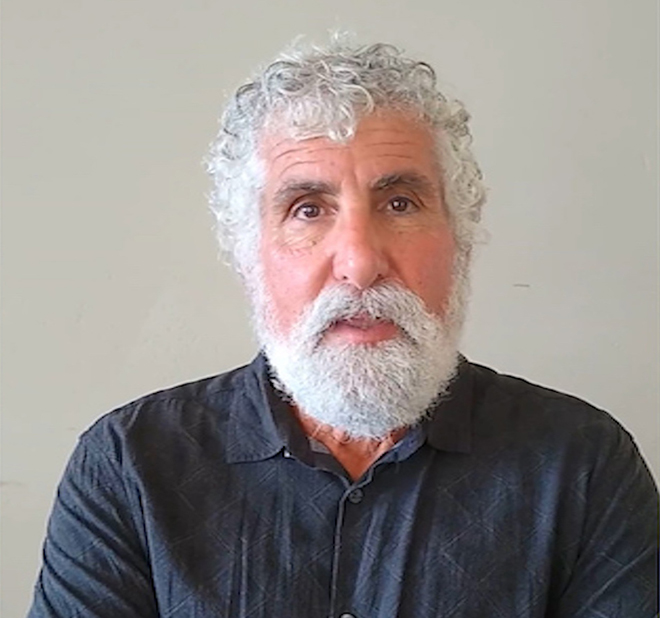
Dr. Mark H. Siegel: I would like to congratulate Ikram Sehgal on the publication of his twelve volumes of A Personal Chronicle of Pakistan. I really regret that I’m not able to attend in person, but I still feel that I’m with you today. As someone who’s read a lot of the articles when they were first published, I find it a fascinating chronicle of the history of Pakistan, the surrounding areas and world politics over a 40-year span from somebody who was both a participant in the events and also impacted the events.
What’s really important about this volume is that Pakistan is not very well understood in the outside. Most of the information people receive is from people who are expats or who have an axe to grind with Pakistan. The beauty of the Chronicles is that, it’s written from the perspective of somebody who truly loves Pakistan and feels Pakistan has a future, and has great potential. However, Ikram does not write a book that is glowing and always complimentary. He’s very critical, regardless of who’s been in power, what were the political parties? He gives a fair and honest assessment of Pakistan and of the neighboring countries, as well as the geopolitics that take place in the region and in the world in general. So, I would highly recommend this book to anybody.
Also on a personal note, I would like to say a little bit about the man since understanding the man helps understand the book itself. Ikram is somebody who I would consider a very righteous man and a family man. He’s somebody who lives his family values and implements his family values in running his business as a large family where he takes care of people who work for him. I myself have gotten to know Ikram and we jokingly refer to each other as I’m his Jewish cousin and he’s my Muslim cousin. We’ve had a wonderful time together with our families. My wife and I look forward every year to getting together with Ikram’s extended family and talking just about any subject that comes to our minds. So, again, taking this back to the book; the book will be a fascinating journey for you, taking you through the mind’s journey of Ikram Sehgal as he explains the political realities and the potential future of Pakistan over a 40-year period. Thank you and best wishes to Ikram.
Dr. Moeed Pirzada: Let me now request Air Marshal Masood Akhtar sb for his comments.
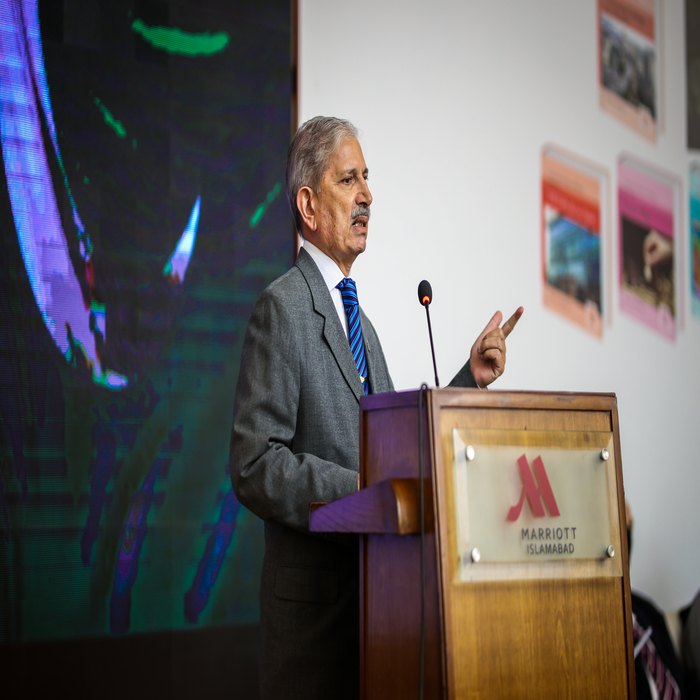
Air Marshal (R) Masood Akhtar: Bismillah-ir-Rahman-ir-Raheem. Ladies and gentlemen, singular privilege to talk on the book launching of this big compendium on national security. I advise anyone who wishes to find out how Pakistan became secure or insecure over the last 30, 40 years, this is what is to be read. I came to know Ikram Sehgal sb very intimately back in 2001-02 where I was CI National Defense Course, and we wanted to find out as to how should we process national security. We were found wanting, we didn’t have too many ideas, so I called over Ikram sb and we called over 2-3 other people, military men also. I can tell you with belief, Ikram Sehgal sb did a lot of good to us. We learned so many things from him, but when Ikram Sehgal sb was talking about the same book launch at Karachi, he made a very telling statement, and he said, whenever he and his sister went to East Pakistan, they were called Punjabis, and whenever they came to West Pakistan, they were called Bengalis. I, being a student of national security nobody, ladies and gentlemen nobody should have the right to put down the identity of another fellow being in an Islamic country and a democratic country.
I’ve retired as a three-star, we have ex-Prime Minister, we have ex-Chiefs of General Staff, we have the elite of the elite sitting here. I’m sorry, in Pakistan we are known lesser as Pakistanis. We have the senior French diplomat sitting here, Sir, we don’t have equality, liberty, fraternity and this is a lesson we need to learn. We are known more by what caste, color, creed, language, province, professions. Now, that’s not on. That is the worst way of making a nation secure and the people secure. When we look at Noor Mukadam, we look at those four girls who were abducted from Lahore and found in Gujranwala, we should be ashamed of ourselves. This happens every day to our children. I think this is absolutely shameful.
Ikram Sehgal sb, coming back to what General sb said and what was also referred to, when he became a prisoner of war in Panagarh, he escaped from there in a vest, in a lungi, barefooted, monsoons, pelting rain and at night, he is walking towards Calcutta and a truck picks him up. If we are looking for something with belief, providence comes in; there was a road that was waiting for him, a truck, there was a Sergeant Frank Adair. This was the very hall when last time his magnum opus I call, Escape from Oblivion that book was launched and I spoke on the same very subject, and Sergeant Frank Adair received and then he went on Air India flight to Delhi. Then, there was this Brigadier who said Ikram Sehgal, you are declared a traitor, it will be better for you to go to States, go to Europe, build your life, enjoy yourself. This obstinate Captain he said, Sir, I have to go back to fight for my country. This, he has done repeatedly for Pakistan. So he goes to Kathmandu, goes to Bangkok, comes to Karachi, and lo and behold what happens? He is received, and he is to be court-martialed, like Ali Kuli Khattak sb said, and then of course, some sanity prevails and they said, okay, one person more to fight and die for this country and he is sent to, I’m telling you this story because this is happening even today, and we all need to take care of this. So he is posted to erstwhile Dhamyal and to his shock, he finds out that the pilots there and aviators and his fellow officers, they refuse to sit on the same table. So, in a huff he asked for a posting to an infantry unit, ends up in Chhor, like Gen. Ali Kuli said, and there, he finds this very maverick, brave Commanding Officer called Brigadier Taj, Khaqan Abbasi sb would know him, and he says you do anything wrong, I will shoot you myself. He does so well that even today, Taj sb when he was alive may Allah bless him he told us that he deserved that, and he named the company in Ikram Sehgal’s name and that company is still called Sehgal Company, and he was given the rank right there and he took the crown off his uniform and put it right there on his epaulette, so that is the kind of person Ikram Sehgal is.
Ladies and gentlemen, fast forward to 2015 I am sitting on a TV program with Col. Imam who was the guru SSG who was training the Mujahideen for jihad against the USSR. I say Col. Imam, be very careful with the Taliban, they will get you, and he says, no, no sir, there isn’t a problem. When I was training Jalaluddin Haqqani who was then heading the Haqqani Group, his son, Sirajuddin Haqqani who’s the boss today, he was a kid. He used to sit in my lap and play with my beard. I said Col. Imam still be very careful. Lo and behold another six months, he and Squadron Leader Khalid Khawaja, two terms junior to me in the Air Force, they get picked up, intercepted by the Punjabi Taliban, they trap them and they murder them. Ladies and gentlemen, for them there was no road, no truck, no Sergeant Frank Adair, who sat right here when the book was launched and he’s passed away probably now, and there was no respite for them.
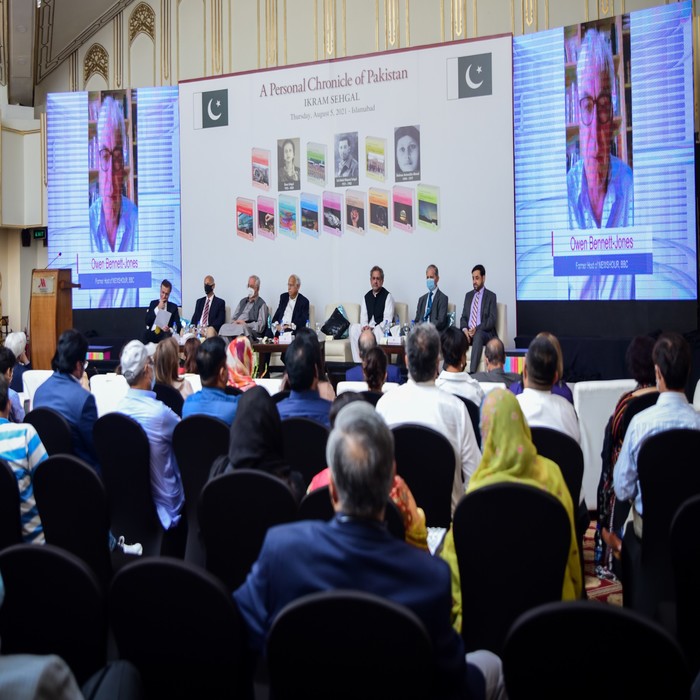
What I’m trying to suggest is that we all need to work towards that end where we have a Pakistan for everyone based on the values. That is what Ikram Sehgal sb has written about, five-six of his articles which are hardcore national security policy strategy. They were, for 4-5 years, that I noticed, part of the National Security folder in the NDU, so they were being read, he needs to be read. But without total human equality, ladies and gentlemen, we can forget about Unity, Faith and Discipline. Amongst unequal people, there can be no unity, no faith, no discipline. I appeal to the people sitting here and you people, we may have opportunity tomorrow. Not to re-establish those values and principles, ladies and gentlemen, is not an option. The failure to do that is not an option. I reiterate with thanks to Ikram Sehgal sb for giving me this opportunity. Ladies and gentlemen, the failure to do that is not an option. Thank you.
Dr. Moeed Pirzada: Thank you Air Marshal Masood Akhtar sb. Now, as you know, anyone who has been reading Ikram Sehgal sb, especially his book Escape from Oblivion, realizes that he has always been split in his passions and love for East and West Pakistan. The former East Pakistan, which is now Bangladesh and therefore here is a message, from Dr. Iftikhar Ahmed Chaudhry, the former foreign minister of Bangladesh, this is a comment from him. You can see his profile, he is a career diplomat. I request his video message to be played.
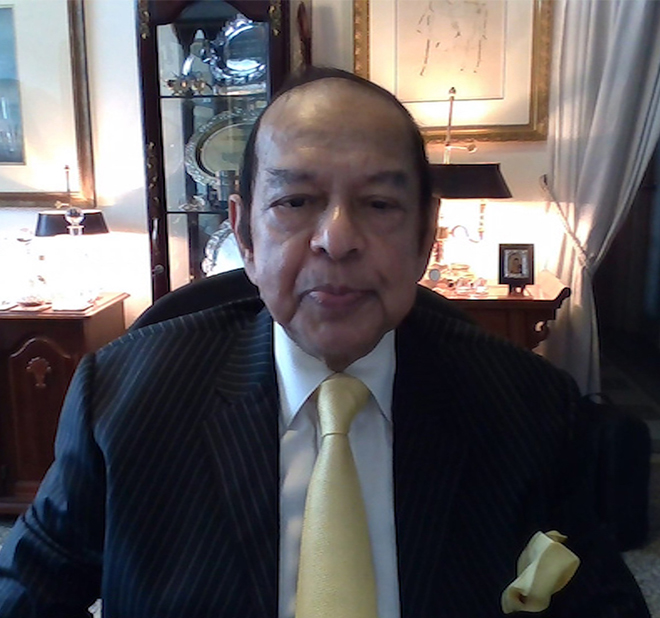
Dr. Iftikhar Ahmed Chaudhry: Good morning from Singapore. It’s a matter of enormous delight for me to be able to say a few words at this joyous launch of Chairman Ikram Sehgal’s works. I have known Ikram, or Chand, a name by which he is known to all his friends in Bangladesh and Pakistan for a long time now. Through this period, he has never ceased to amaze me with the varied facets of his prodigious capabilities. Chand is well and truly a modern day, renaissance man. He started off as an infantry soldier, an officer and gentleman, and evolved into a man of letters able to meticulously pen his thoughts and ideas reflected in the volumes that we perceive today.
He did not just rest there. He employed his fast organizing skills to build up this elaborate security empire, Pathfinder, whose reputation has traveled beyond the borders of his own country to the rest of South Asia. I have seen him contribute to global events such as the famous World Economic Forum the gathering of global thought leaders at Davos, Switzerland.
I had the privilege of hosting him later at an international seminar at The Institute of South Asian Studies of the National University of Singapore reputed to be Asia’s foremost citadel of learning. There, an incredibly discerning audience that Singapore can and does throw up, left deeply impressed. These volumes that are being launched today tell the tale of the travels and toils, of the successes and achievements of the people and the region, and Chand’s own role in that milieu.
An exposure to the volumes will demonstrate that it, i.e. Chand’s role, was not at all insignificant. I would fervently hope and pray that Chand continues to add many more feathers to his cap, and wish him success in all his future endeavors, of which knowing him, as I do, there will be many. Thank you.
Dr. Moeed Pirzada: Thank you. The next gentleman doesn’t need any introduction in Pakistan. I have the privilege of inviting Pakistan’s former Federal Minister for Foreign Affairs and Finance Mr. Sartaj. Aziz sb here to the rostrum to express his comments.
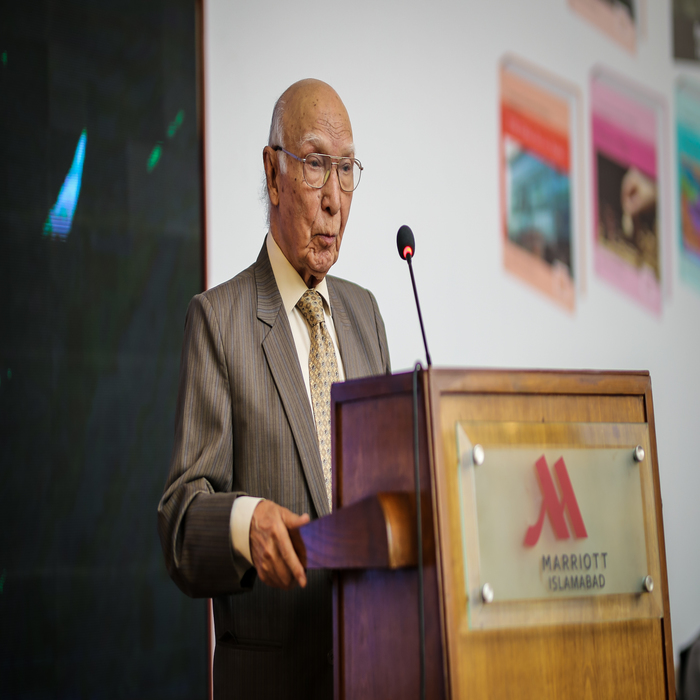
Mr. Sartaj Aziz: Distinguished members of the panel, Mr. Ikram Sehgal and his family, may I also join other speakers in congratulating and complimenting Ikram Sehgal for publishing such a magnificent and valuable collection of his articles that were published between 1985 and 2020. Each volume, as you just heard, has a very fascinating, almost seductive title, which itself intrigues you to go and try to read it. The first one is called Leave the Army Alone; the second one says, Converting Garbage into Dreams, The Wages of Truth, Till Debt Do Us Apart, not death, but debt; Power Play, Passage to Nowhere, The Gathering Storm, The Years of Darkness, Merit Can Be a Disqualification, Sate of Hypocrisy, Light at the End of the Tunnel, Challenging Pakistan’s Destiny. If you read the prefaces of each volume, you will see the logic and the rationale behind these interesting titles.
As you just heard, it is almost 2000 articles of a very large number of pages. As I said, in the foreword to the second volume, in my long career, I have never seen any other columnist who matches his prolific capacity to write so many articles on such a wide range of subjects for such a long period of time. The former Chronicle, of course, covers all important aspects, but in my view, especially important and of more lasting value are the articles on Pakistan’s foreign and security policy, and its geostrategic and geopolitical relations with other countries. Because other articles may have topical value of the issues of the day, but these volumes record history, which I think many researchers, historians, policy-makers, students will find a valuable source of reference material.
I first met Ikram Sehgal in 1985. He had come to see at that time Finance Minister Mehboob-ul-Haq, and I had just returned from Rome after 12 and a half years with FAO, Food and Agriculture Organization. We exchanged notes and phone numbers, and after that we met frequently and our association gradually evolved into a very warm friendship. In 1990, I moved to the Finance Ministry, and the first half of 1990s, was a very exciting period, because a very major reform program on the economy was carried out and privatization to deregulate the economy, 2 major banks were privatized, MCB and Allied Bank. The much-delayed, overdue issue of the water distribution between the provinces was resolved and in March ‘91 the Water Apportionment Accord (WAA) was signed, NFC was set up under the ’73 constitution. We had never finalized to issue an award but in three months, by April ’91 we had agreed to an Interprovincial Accord and Ikram was very excited about this major era, and as you will see from his articles in Volume I and Volume II, he dissects those reforms and those issues, their impact on the economy, and also called me frequently to discuss the implications and the next steps in that direction.
I think this is the interesting part that while he is a security expert, his coverage of the economy in those early years was quite remarkable and very extensively done. In fact, on mangoes he has written five articles (laughter) In preparing for this session, I did not have to go through his CV because I had observed it at first hand in my sessions with him, and as you just heard, his adventures as a helicopter pilot in East Pakistan, and then as a Prisoner of War which is recorded in his book. After retirement from the army, he started the Pathfinder Group to provide security and IT services, and you can see why, because in security services, you can call upon all the retired personnel of the army to come and help you and so, that is a natural thing for a retired army officer to do, but the way he managed it and looked after his staff, it became a very major company. I saw firsthand this Group grow into a diversified business empire, so this also is quite remarkable for an army officer to achieve that result. But with a strong intellect and keen interest in global security issues, he was not content with just being a successful businessman, so he very quickly ventured into the media world, giving frequent interviews on the television on a wide range of issues and then writing the articles which are now consolidated here.
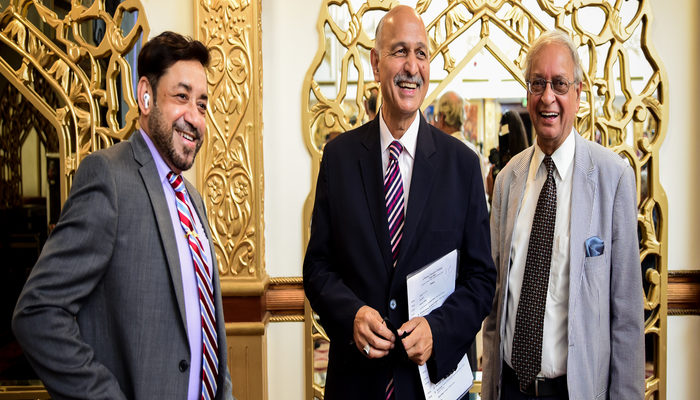
This third dimension of his successful career is the focus of today’s event and dramatically visible in this collection of his articles. Another notable accomplishment of Ikram Sehgal was his role in raising the Pakistani flag at the World Economic Forum in Davos almost every year for the past so many years. In 1992, after the major reforms Pakistan received a lot of publicity. So in 1992, Pakistan was declared the focus country, in other words, many sessions were held at that time on Pakistan. So I persuaded about 10-12, I think, prominent businessmen to become members of the World Economic Forum. At that time, the subscription was $10,000 for membership and to participate in the Forum and attend various roundtables that were being held on Pakistan and therefore the event was a success. As the practice is, the focus country has a special seminar next year to discuss the investment opportunities and concrete proposals. So, that is the occasion when Ikram Sehgal asked me to include him in the delegation for that March ‘92 session on Pakistan in Zurich, Switzerland, and that was very providential, because gradually all those 12 business leaders that I had persuaded dropped off but not Ikram Sehgal. He became more and more active, and from 2003 onwards, he has held an annual what is called Pakistan Breakfast, invited 120-150 prominent guests to come and meet the head of the Pakistan delegation which was generally the Prime Minister of Pakistan or the President of Pakistan. So that was very important event and he single-handedly has managed to keep Pakistan on the map and has participated in many other activities of that forum, and Pakistan Breakfast has become a well-known event at Davos because that is a unique event of its kind.
I think before concluding, I would like to refer to his human quality of his abiding respect and love for his family, his ex-army colleagues and his close friends, and this is very, very visible in all the dedications that he has given, with the warmth and the respect with which he refers to them. This is a quality that is dwindling in Pakistan, and I think his commitment to the circle of people he belongs, and that is the humanity in him that actually is behind much of his success. So, thank you Ikram for publishing such a magnificent collection.
Dr. Moeed Pirzada: Thank you Sartaj Aziz Sb. The next commentator, the video message reminds me of very interesting phase of American history, we generally know that there are usually only two presidential candidates in the United States. In 1992, there was an unusual thing when a third candidate emerged, challenged both political parties, an independent businessman from Texas, Ross Perot. He managed to take almost 20% of the vote and led to the defeat of the George Bush Sr. Courtesy Ikram Sehgal sb I had the opportunity of meeting his son, Ross Perot Jr. at Davos in Switzerland during the conference of 2019. He’s the chairman of the East-West Institute. Here is his video message.
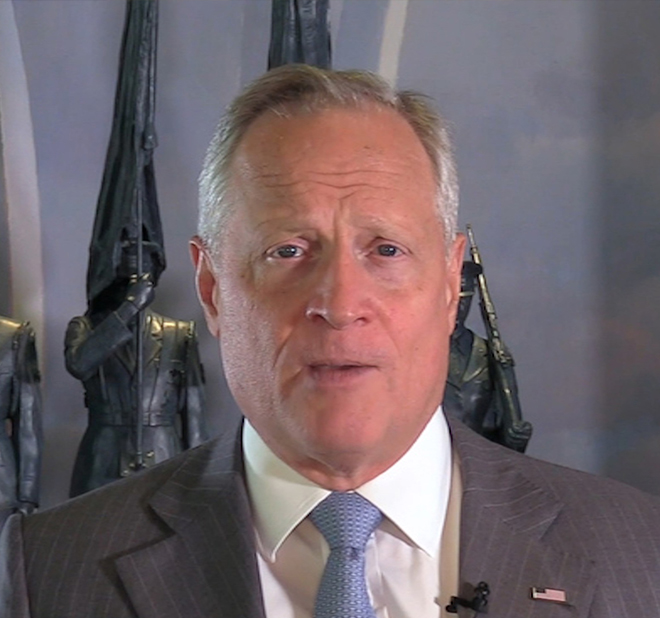
Ross Perot Jr: Ikram, thank you for inviting me to be with you today. It’s exciting to hear about your new book to have the book launch. I wish I could have been with you, but I hope this video message will suffice. You should have a very good day and I know that your friends are going to enjoy the richness of your book and learning more about you and your great career. I hope somebody today will also ask you some helicopter pilot stories and you can talk about your amazing flying career. I wish you the best of luck and I hope to see you and your family very soon. Thank you.
Dr. Moeed Pirzada: Pretty short and sweet. The next message is from, as Sartaj Aziz sb also mentioned Ikram Sehgal sb was one of the founding members, the initial member of the World Economic Forum and he has been for the past 20 years raising Pakistan’s flag, he is organizing meetings, breakfast meetings with key Pakistani leaders. Prime Minister Imran Khan, when he was the opposition leader, Prime Minister Nawaz, President Musharraf, they’ve all been participating in the Davos meeting, courtesy Pathfinder group and Ikram Sehgal sb. Here is a message from Børge Brende, the President of the World Economic Forum, the message will play.
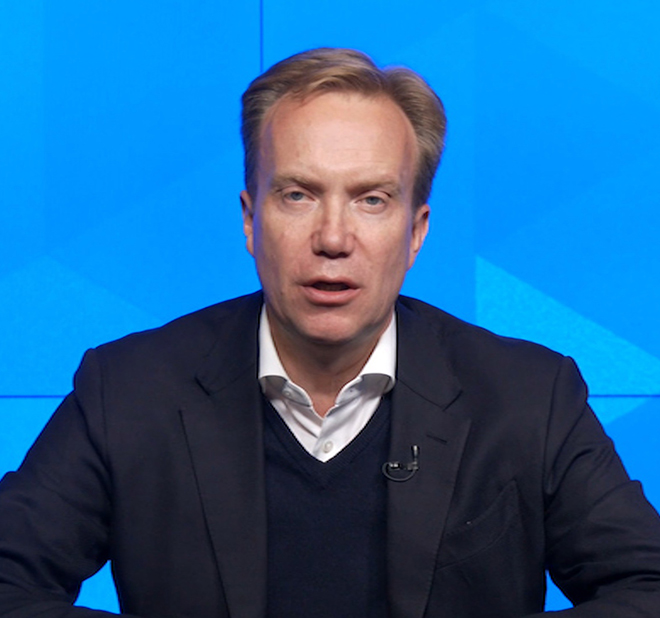
Børge Brende: Dear Ikram, the launch of ‘A Personal Chronicle of Pakistan’ is a momentous day for you as a writer. It is also an opportunity for all of us to reflect on the defining period of Pakistan’s history as seen from your privileged vantage point. I say privilege, not because you have lived an easy life. In fact judging by another one of your books Escape from Oblivion, even in the short span of your youth, you appear to have led several very challenging lives. Important thing, however, is not only did you survive each period of struggle, thanks to your principal determination, you were able to flourish and each distinct chapter of your life.
No doubt, you had to make difficult choices, whether or not to risk your life in a daring escape from a prisoner of war camp, whether or not to move on from army, which was such an integral part of your identity, whether or not to leave a secure profession as a commercial pilot to set up your own business, whether or not to enter the fray of Pakistani public life with the publication of your first column. The silver thread linking your escape from a prisoner of war camp with the launch of these twelve volumes today is your commitment to doing something meaningful with the life that we have all been given. This commitment of yours, naturally extended to a desire for your country of birth to develop a meaningful economic and diplomatic role for itself in the region and the world leading to your long-standing engagement, with the World Economic Forum.
For several years, recently also with your son Zarrar, you have flown the flag of Pakistan at the Forum’s annual meeting in Davos, doing your part to make sure that the business community and the government is properly represented alongside other nations. Behind your writing is the desire to see Pakistan’s potential fulfill, both by courageously pointing out what does not work, and by having the vision to identify new opportunities for its development, and Pakistan has many opportunities. As such, these volumes are a gift to the next generation who would do well to follow your principal example in both business and public life. Dear Ikram, my sincere congratulations on the launch of these twelve volumes. Also, my congratulations and full respect for what you have achieved, both in business, and in public life, and even more important for standing up for important values in your country and globally.
Dr. Moeed Pirzada: This was Børge Brende and I should have mentioned that not only he’s the president of the World Economic Forum, he is also the former Foreign Minister of Norway, and I am glad that he also agreed with me, what I said at the outset that this collection is actually a gift to the next generation. With this, I will request Ikram Sehgal sb to come himself and give his commentary as to how he saw this initiative. Big applause for him.
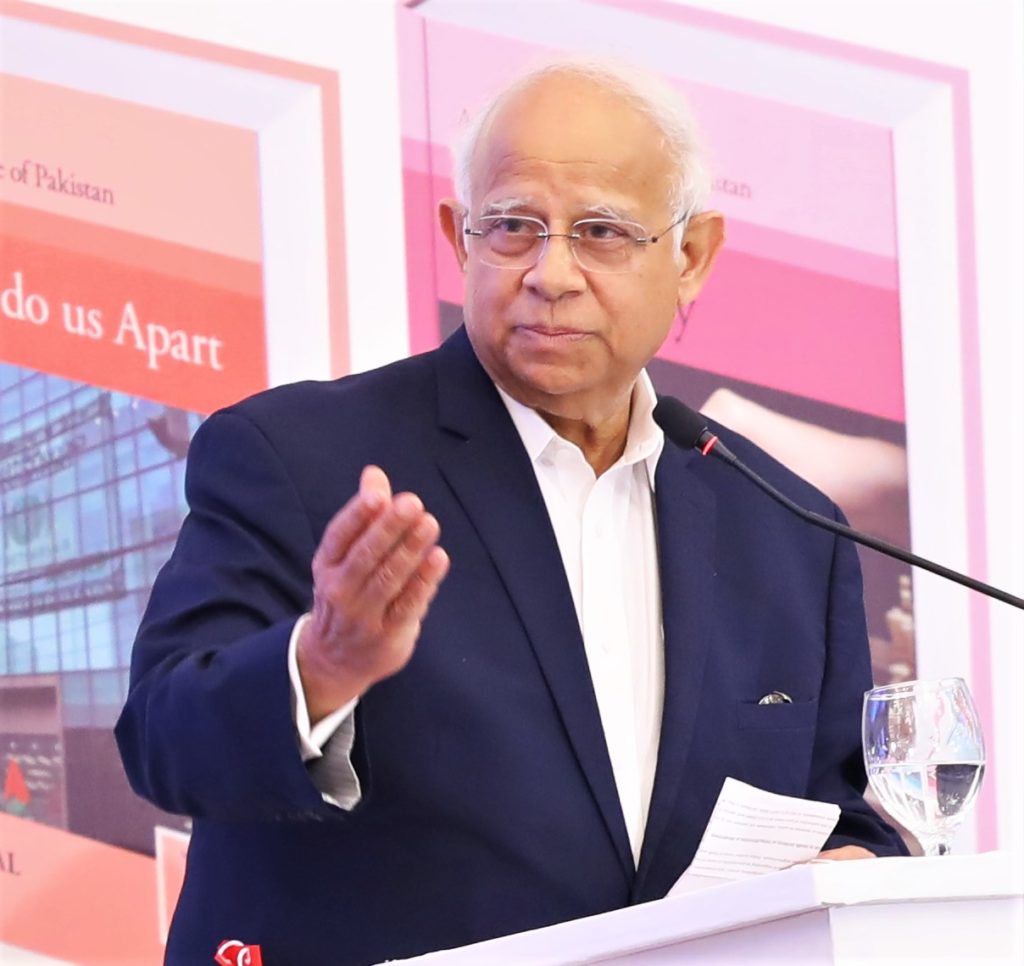
Ikram Sehgal: Thank you, Moeed. Bismillah-ir-Rahman-ir-Raheem. I think the first item should be to thank all those people who made these volumes possible. One should start with one’s family and what better to start off with my own wife Shehnaz Sehgal, I think she’s been if I use the word patient that would be an understatement. She has been very patient, while I’ve been writing and I am grateful to her because when I left the army and I had no money, and that day I told about the gentleman that came from Balochistan to Karachi, this canteen contractor, he gave me 600 Rupees. From Nowshera he came that day to the presentation at the Prime Minister’s House, Hayat. I came and told her that I’m out of the army. I have no job. Actually, one feels isolated, desolate, and I must thank her for being with me through all these years.
And of course, not to forget my son Zarrar who actually is more of a friend than a son. I’ve been very lucky to have a son like him, he exceeded all my expectations, a better version of his grandfather who was far more accomplished than me. My father who would have been a hundred years old, who died in fact on August 13, 1983. Zarrar has done exceptionally well. He has not been clouded by what we do in Pakistan in our feudal society, that you know you’re a son’s son. He’s achieved in United States what many cannot even dream about. Acclaimed by the New York Times, voted among the federal lawyers as the best lawyer in United States in his own discipline.
I am lucky also in getting a daughter-in-law, I got a daughter actually in Kashmala, she has been a source of strength, not only to Zarrar, but to produce one of the finest grandchildren that one can ever hope for. I took them up yesterday to a place in a ridge and I told them about a school In’sha’Allah that we will be building, and I gave each of them, Amani, Elena and Suleiman, responsibility, of making that school successful. On the roads, I showed them all these children, walking to school and I told them they all walk to school but they had nothing to hope for what is taught to them in the schools. I’m grateful to Brig. Mujahid Alam who is here from Lawrence College and all the students of Lawrence College which I requested for especially. Mujahid said we should declare it a sub-campus of Lawrence College and we are going to have at least a thousand boys and girls studying there. We are going to have coasters going up and down, making sure that those boys and girls go to school.(applause)
Of course, not to forget my daughters Haya, who unfortunately could not be here. She in quarantine, a wonderful artist. She did terrifically well, got a lot of acclaims as an artist, turned into a writer, and now is an acclaimed writer, and she certainly writes better than me. Today she is in quarantine because of some restrictions on the job that she’s doing so she couldn’t be here. And Nefer who’s here -Nefer never ceases to amaze me, because whatever she does, she does wonderfully well, the only problem is she only does it for two years, then moves on. But, she does it very well. There’s no doubt about it, whether it’s music, whether it’s creating art, leather works, whether it’s doing something else. Let me tell you one story about her which not many people know that actually DG Rangers sent her back with an escort because she was at that time working for Express Tribune, and she was right in the middle of a firefight between the MQM and the Rangers and she was taking photographs from both sides. So they decided to send her home under escort rather than be right in the middle. But more than that, somebody was shot in her presence in a restaurant, in Clifton, shot point-blank, and everybody left, he was bleeding she took off her dupatta, put it on his neck and stayed with the gentleman till they reached the hospital and he survived, so that is brave.
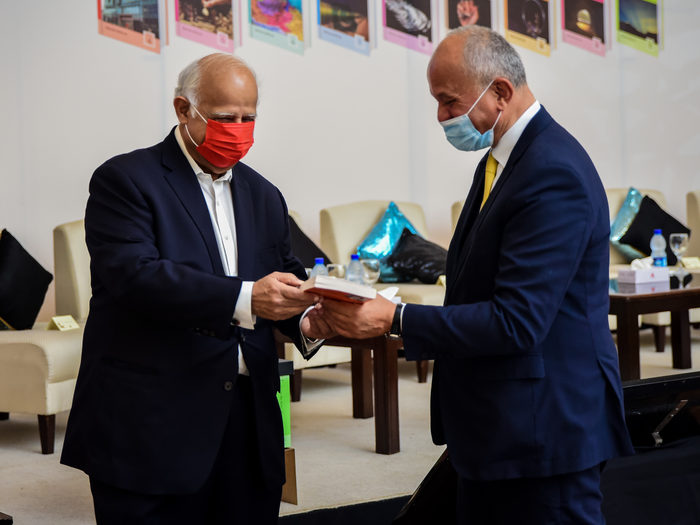
Having said all that, I go back to other people that I must thank, my secretaries Zeb and Humera who diligently cut out these newspaper articles and kept them alive, kept them in storage which a colleague of mine, Dr. Bettina Robotka, who was professor of South Asian Studies at Humboldt University in Germany came and helped recompile. Not to mention Oxford University, they said that if we were to do it this will take us about four to five years and I said, I don’t have time I am already 75. They said what we can do is we can do it from end to end but we cannot put the word Oxford there, I said fair enough. The ultimate thing was that I wanted to launch it on 17th July, and on 29th June it started going into print in a place in Lahore called Topical Printers and that was amazing, that was Pakistan’s expertise at its best, they produced these volumes in those days. They said we will deliver it to you on 15th of July at 4 o’clock and they did that. The quality of the work that you see is totally amazing to me. This was done with a lot of passion and that is what Pakistan is at its best, just give us the right leadership, and we can do anything.
Let me tell you about the driver and the two vehicles that came all the way from Lahore, started at 6 o’clock, they got caught in a traffic jam and 8 o’clock they got out of Lahore. This man, I rang him up at 12 o’clock and I said, take some rest. He said Sir I will take rest at sunrise. I found him at Moro the next time I talked to him. I said, what are you doing? He said Sir, I am resting now. He was supposed to get in at 6 o’clock in the afternoon on the 16th of July but he made it at 2 o’clock. That was the dedication of the drivers of my company. Whatever I am today, I am the sum of those blue-collar workers combined with the best of the armed forces. You can really get the best out of them. You just have to give them the right leadership, you have to make sure they have a comfort level, their welfare is looked after.
I will now turn to the speakers one by one. It’s been really something which has been of great significance. I’ll start with Shahid Khaqan Abbasi. I get into trouble for this many times, I love Imran Khan, I’m not a member of PTI. I love him for his sincerity. I love Shahid also. He was one of the best Prime Ministers we had. There’s no doubt about it. I’ve asked his staff, he used to make sure everything is done before he left. The greatest quality of him was that if you give him a telephone call, he’ll call you back, that I give to Imran Khan too. That is a quality of leadership. You said, I’ve got the wrong political opinions etc. I tell you that you’re in the wrong political party Shahid sb (laughter) The thing is that I owe a great deal to Shahid’s uncle and my senior, Brigadier Abbasi, at that time we used to call him Colonel Taj. He was a soldier’s soldier. He was so brave, you could not describe, really, he was a cut above that. We landed up in Umerkot, Chhor, the front had collapsed. People were afraid, there was no front, the two regiments 26-Field and 40-Field people know, we were firing over open sites because the Indians were occupying the ridges and if they were into the greenbelt, they were into Hyderabad in 24 hours that would be the end of Pakistan. Brig. Taj arrived there and to anybody who would listen, he’d say “you tell them Taj is here, and we will die”.
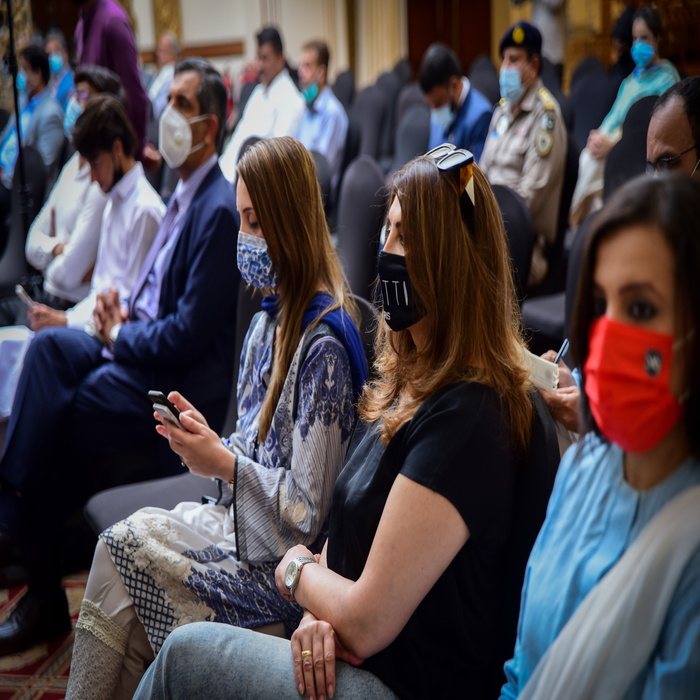
This man, maybe a few days before when I went to the Regiment, he told me you have a Bengali mother I hate you. He gave me Delta Company and I’ll tell you the story of Delta company. He said I’m going to call it Deserter Company. On 13thDecember, I must tell you the story, we attacked, which was a stupid thing to do, up the ridges to an Indian position, two companies went up, two company commanders one had a heart pain, the other had a sprained ankle so he put me in command. We went up and officers joined us, some of them later became Generals. They joined us saying that some will go with this company, some will go in that company. We went and we dipped our bayonets into red paint because there was a lot of artillery going on, and we could see the flashes, I think the Indians saw us and decided it was better to get away from there. We didn’t meet a single Indian except those people who were wounded and were left behind, but suddenly we had captured the ridge, and there were you know, green over green going over all over the place, greatest victory etc. Brig. Taj drove up in tanks of cavalry and asked me: “well done, how many Shaheeds?” I said, “Nobody”. He said how many wounded? I said, “Nobody”, he asked “what happened?” I said “We didn’t meet them. They just ran away.” He said you shut up and you will shut up. You just won the biggest ridge in Pakistan, and we’ve got to flash it from here to GHQ and you will not talk about it. So I said okay, right, then he gave me the battlefield rank of Major, but more than that, he gave me something which I will always cherish throughout my life, he renamed my Delta Company as Sehgal Company. Till today, that Company stands there. It is stuck in the throats of many people, but not many people alive today can say they have a subunit named in their own name in any infantry unit. For me, that is the greatest honor, much more than all the wealth and all the accolades I’ve ever received, to be counted as a soldier among soldiers.
About Brig. Taj, actually, people do not know, he saved Pakistan that day. People belittle it, he saved Pakistan that day, because that day was a crucial day. Shahid, he was your uncle, but I really, really salute him, and you know when I went, I was late for his funeral, I went 2-3 days later, I was stunned by the fact that everybody knew about me. They did not know that much about his sons but they knew about me, because he would keep on talking about me, keep on defending me, wherever, and I had many detractors and one of the biggest detraction was that when I stood first in the Captain to Major promotion exam out of 3,500 officers in 1973, despite my wife’s dire prediction that I would fail, when I stood first and 600 passed and I was very happy, and he says, “bloody fool, why did you stand first?” I said “what’s wrong?” He said “in this country, merit is a disqualifier. They will throw you out because you stood first.” So I decided not to do the Staff College entrance exam. General Iqbal who was the DMI before that forced me, he said you will appear, I appeared. 300 appeared and 30 passed. I will not name some people who failed, Gen. Ali Kuli’s friends also failed but got to the Staff College anyhow because they had to send 100 people. But, you know, that is the type of stuff that Brig. Abbasi was made of, and you should always be proud of belonging to such a clan Shahid, and belonging to such a man being your uncle. Like your esteemed father, who is no less.
Mushahid, what can one say? We’ve been friends and Mushahid loves daal, langar ka daal, he would come and have daal from time to time. He’d say, I’m coming and he would come and we discussed many things. When I wrote that piece, about ethical or unethical, how true it was, and it was coming from the heart. He was running an ethical campaign and Husain Haqqani who was running an unethical campaign and see what he has done to this country. Ambassador Aitzaz has gone away I think, he had such a tough time retrieving Pakistan’s position because of what Husain Haqqani has done, irretrievable damage to Pakistan. Mushahid was always there standing up as a counsel and we shared many things like Mushahid mentioned, but one thing he has not mentioned and that was that one of the conversation we had at that lunch was, who will be the next Chief of Army Staff and I had only one choice, and it was General Ali Kuli and Nawaz Sharif was skeptical, not because of Gen. Ali Kuli himself, but because of Gen. Ali Kuli’s family, you know, Saifullah’s were there, his own family was rich, he was a soldier’s soldier, so, I’m sorry to say this, but Mian sb used to go for factory managers, not Chiefs of Army staff, so, they used to choose – this is a good factory manager, he will listen to me. I told him in his presence, I said this man will never do a coup d’état. He will never do that. The word power play is taken from a movie called Power Play. General Musharraf took that by the book. Gen Musharraf used to go to Lahore, my friend Gen. Akram who was the Corps Commander used to tell him, Sir what are you doing? You are in the run as a contender, and he’d say, no Akram I’m all right. He was actually giving a signal out that I’m alright, I can be malleable, so Power Play worked and I think Pakistan’s destiny turned the day General Ali Kuli was not made the Chief of Army Staff and General Musharraf was made Chief of Army Staff.
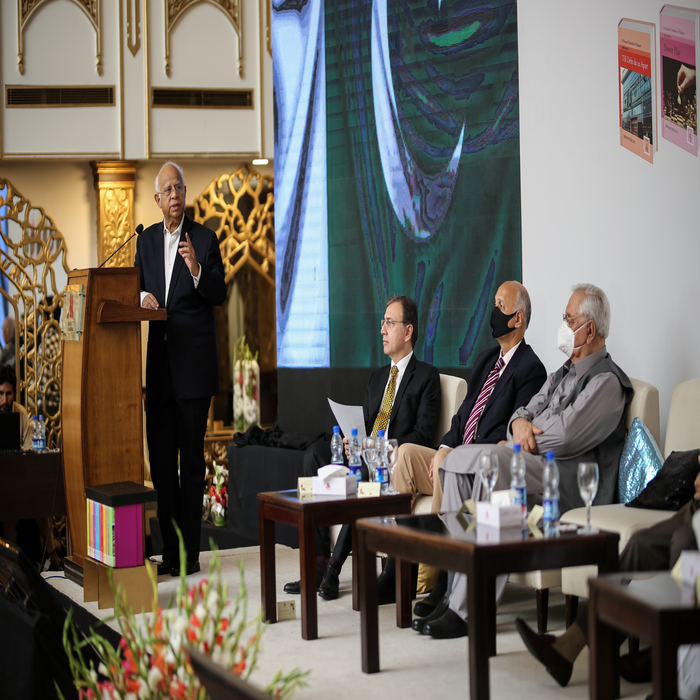
Gen. Musharraf was a very good professional soldier, do not mistake it. He was also a very brave, professional soldier. Unfortunately, he had never been in combat, and unless you have been in combat, you really do not know the men from the boys. Until the sound of a bullet goes past your ear, you would not know it. Whatever we have to thank him for, he did good work in the first three years. We have to thank him. He did good work, but the NRO was the blackest law ever in the history of Pakistan. He legitimized criminality, and we got what we got afterwards. Unfortunately, things changed.
I was very fond of Mian Nawaz Sharif, I say it openly, I used to absolutely support him. I supported him. Mian Nawaz Sharif doesn’t know it, but I went into great trouble with PPP. One of them was that my company was actually labeled and my NOC was canceled, and then I had somebody go, Makhdoom Ali Khan sb went and got a stay order against that and that is how my company functioned. I asked Makhdoom Ali Khan the other day, I said you got the stay order for me in 1994, and you’re not still doing anything about it, he said just let it be, any time they move against you 26, 27 years later, there is a stay order. So income tax, this and that, we suffered considerably but I had one great problem with Nawaz Sharif, when he did not select Sartaj Aziz sb as the President of Pakistan. I said here is a man who is expert in agriculture, expert in finance, expert in foreign affairs, integrity beyond question, dedicated, committed, so what are you doing? So I wrote this article and it is in the books, but then the last straw was the storming of the Supreme Court and I told him, I did not vote for you to storm the Supreme Court to do bhangra in Supreme Court room number one. I said, I did not vote for Abbaji, I voted for you, so don’t let Abbaji dictate your presidents. That was a mistake, that man had so much to give to this country. Between 1990-93,what Pakistan achieved, India copied totally. You had a person who could give so much to this country. I like Shahbaz Sharif very much, he does a lot of good work but doing good work, and doing work for yourself, there’s a difference.
Gen Ali Kuli talked about Sarmila Bose. People don’t know that General Ali Kuli gave that name of Dead Reckoning to her when she was there. It is an aviation term where you fly without a map. She was influenced by Gen. Ali Kuli’s interview with her. She said he was so candid and so credible. I said you must interview other officers and she said when we interviewed all of them, I found the difference between truth and fiction. Gen. Ali Kuli, a lot of people do not know this, but Sarmila’s book Dead Reckoning was because of you. Of course, I have to go on to other people.
What can I say about Air Marshal Masood Akhtar, he said it all. We’ve done such wonderful discussions on national security. Actually, we had no national security strategy. We didn’t have a blueprint. I was shocked. Here I was, my only education was the water of the Ilyasi Masjid, outside PMA, which if you don’t drink that water you will never become a good officer. So that was my education, I graduated from PMA, and that also, because the war shortened our period there by about six months. I really had no education and I have learned on the job. I did not find anybody more credible, more committed than Air Marshal Masood Akhtar, and our friendship has lasted mainly because of that, on a bedrock of integrity, the bedrock of commitment, a bedrock of something for Pakistan and only for Pakistan, not for self. Thank you.
Of course not the least, my friend Kaleem. You know, I’m a great believer in that if a police does their job, the country will progress, and unfortunately the police was not doing its job in Karachi despite the fact that Rangers were there. It was not doing its job because of the political things that were happening. IG Kaleem stood his ground. He stood his ground in the face of such adversity. He had such courage that it was clearly apparent. He created a team of good professionals, today that momentum is going on in the Sindh police. Sindh police was the worst police, today in the rural areas it is still bad, but in Karachi and urban areas where he could make it happen, he improved it a lot. I was very much taken in and I said that he is somebody to look at and be proud of, and so I am very proud of you.
I know I am going past my time, but a few more things. Well, the other day, the Prime Minister Imran Khan it was very nice of him to have me in the Prime Minister House to have perhaps the only dedication to a book in the Prime Minister House. His Excellency was telling me that he can’t think of any other place where a dedication of book had taken place in a Prime Minister’s House. Like I said, I’m not a member of PTI, I wish Imran Khan will read the book Grant by Ron Chernow. Ron Chernow wrote about General Grant, one of the most successful military leaders of the United States and he picked out the best military aides that were possible during the war. He carried those people after one presidency when he was driven as president into the White House, and it was the most disgraceful presidency in that sense that it was the most corrupt. He was not corrupt himself, but his aides were inefficient, incompetent, the same people who had done so much work.
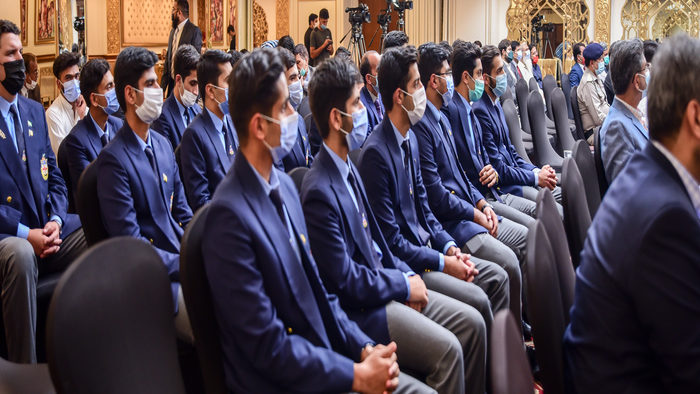
I remember a time when Imran Khan used to come to Karachi, we used to cocoon him with a hundred and fifty people in shalwar kameez, just to make sure that the MQM didn’t get him before he reached our gate or reached the nursery. People from PTI used to come at our doorstep asking for security for Imran. I never belonged to any political party and have no intention of belonging to any political party. I did it because I thought there was sincerity in that man. The man remained the same. Those same chaps don’t return my telephone calls now, but the Prime Minister does. This is the quality of aides that you choose. Unfortunately, the best cabinet that ever functioned was the 1990-1993 Cabinet. It was tremendous. It had good quality people in PMLN cabinet. Good people, efficient people, they did their work. Things deteriorated after that, I don’t know why. But coming back, on that event at the PM House, the Prime Minister was very gracious. I said a lot of things to him. I talked about inflation, he acknowledged that, I talked about law and order, justice. I said you talk about the wording of the law, you have got to talk about the spirit of the law. The wording does not matter, the spirit of the law matters. If you do not apply the spirit of the law then criminals function in the name of justice and justice becomes a crime. The Prime Minister was very gracious and I thank him that he had this function and therefore I think to an extent I may have balanced it off, we have Sartaj Aziz sb and Khaqan Abbasi sb. To me it does not matter to which political party the person belongs to, to me the individual matters. What he can achieve for Pakistan matters, what he can do for Pakistan matters.
What a tremendous country we have. I said that day and I say it today we have the second largest copper and gold reserves in the world, third largest coal reserves in the world, fourth largest cotton and cotton industry in the world, fifth largest milk producing country in the world, sixth largest rice producing country in the world, seventh largest wheat producing country in the world, we have produced a nuclear bomb, and yet a country that can feed itself is going nowhere because of the lack of leadership; because we have a feudal mindset.
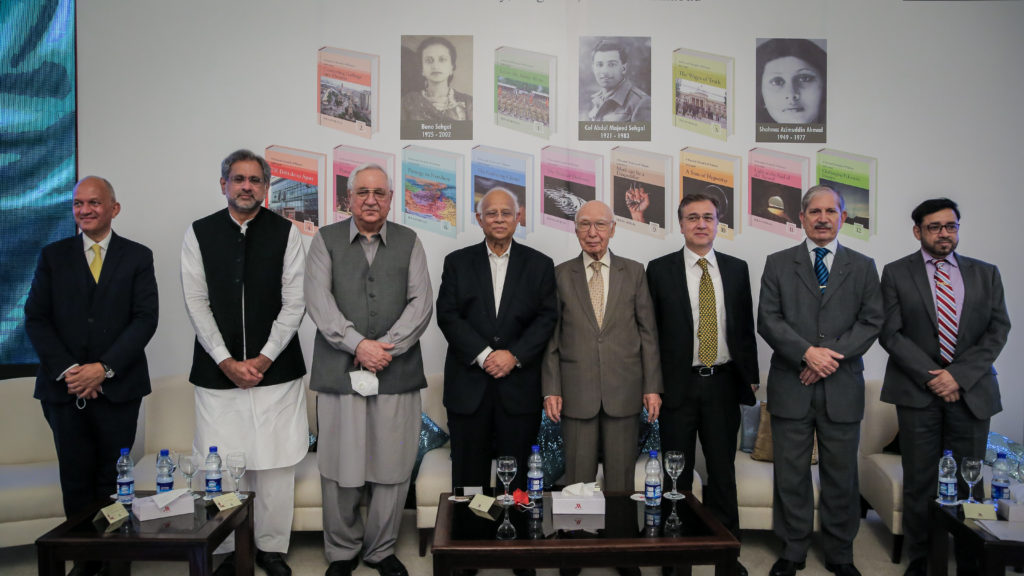
One of the great things about Sartaj Aziz and Shahid Khaqan is that they’ve never left the party, but if you see, there are people who join every cabinet. I went to the PM House after 23 years, but there are people who have been in every cabinet. They were with Gen. Musharraf, with Asif Zardari, with PMLN Cabinet. What loyalty do they have? They do not have loyalty to one leader. Maybe you can change, you can have a difference of opinion, but they keep on changing parties, just to stay with the party in power. So I think Imran will be a great leader, he is a great leader, and I sincerely hope that he succeeds for the sake of Pakistan, but he has to do something about the people around him, the self-serving people who only think about themselves, they do not think about the country. They must think about the country.
At the end, I would like to say that I’m very grateful to all of you, the speakers, I am very grateful to all the people who have come. We had planned for about 150, I know that there are more than 200 in the room. For me it is a great honor and privilege to have you. I know we have gone past our time but I thank you from the bottom of my heart. Thanks to everybody. (Applause)


